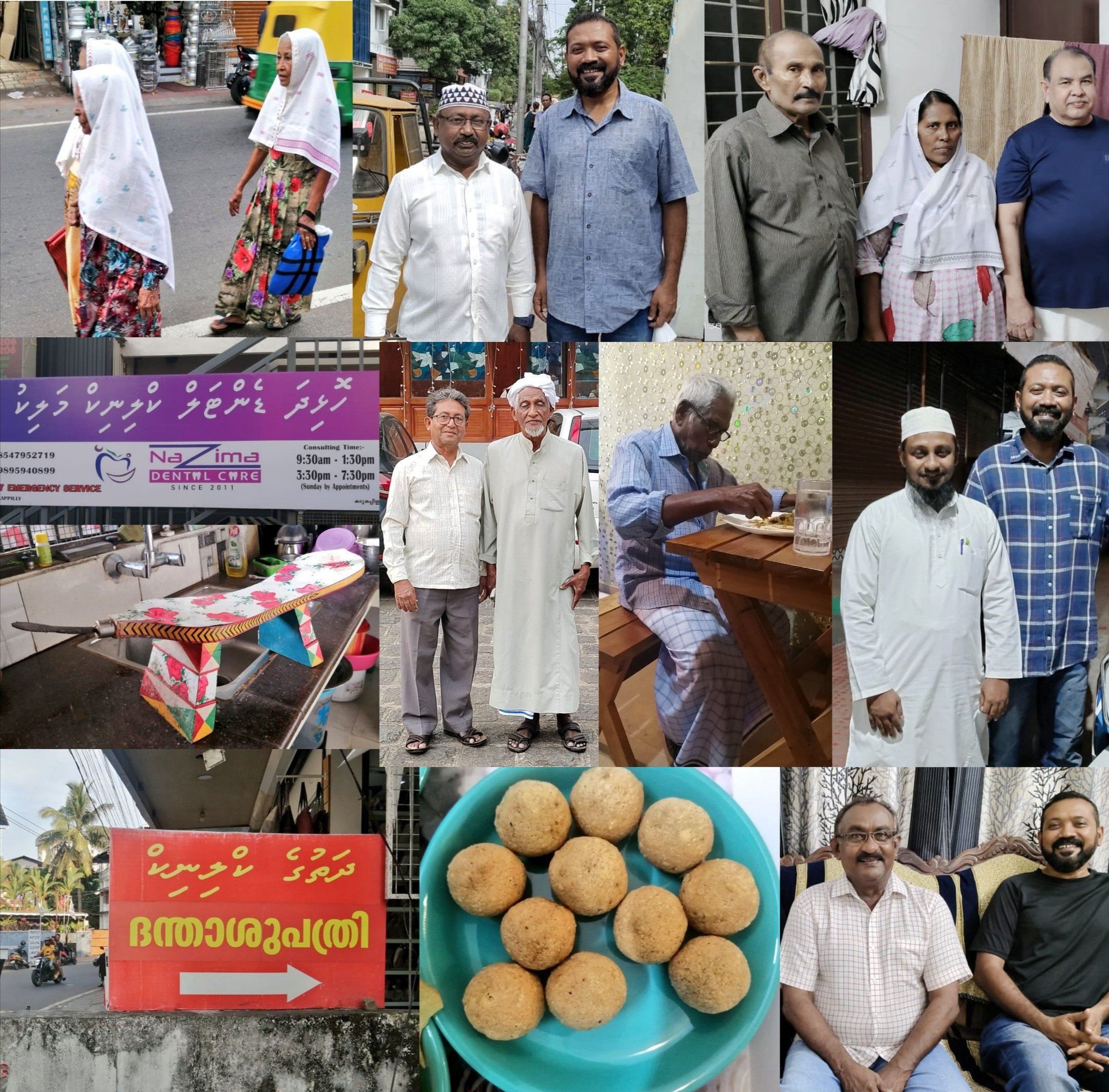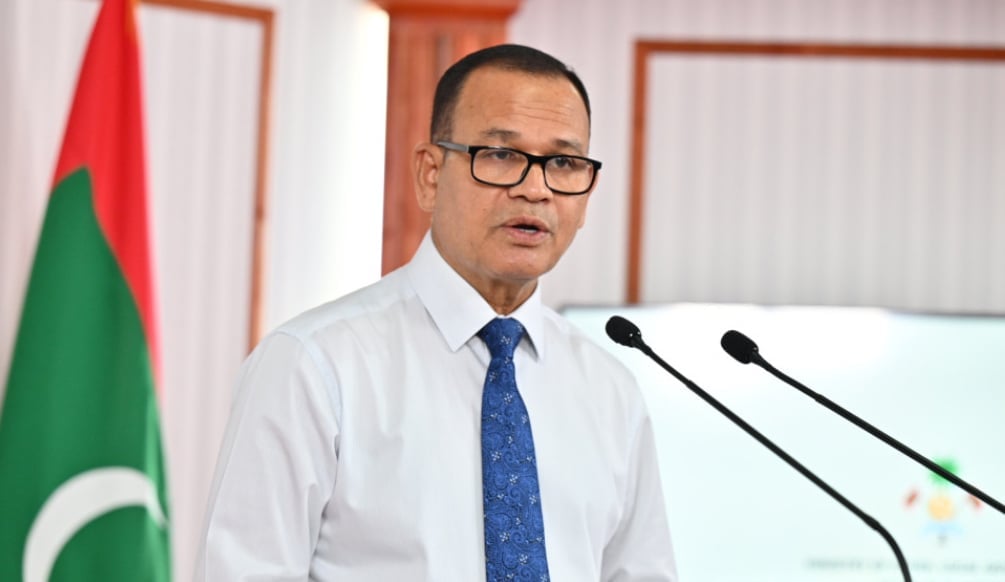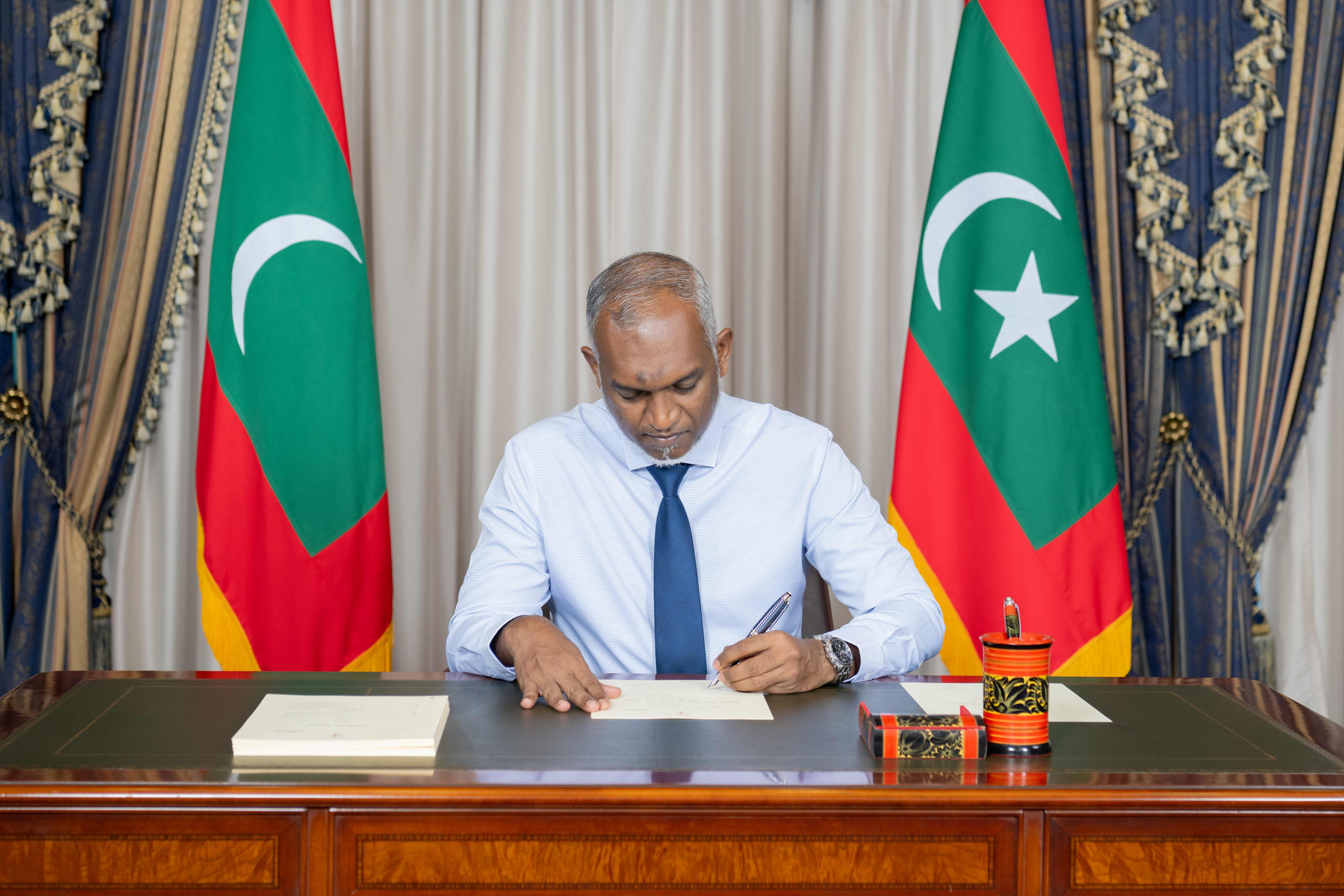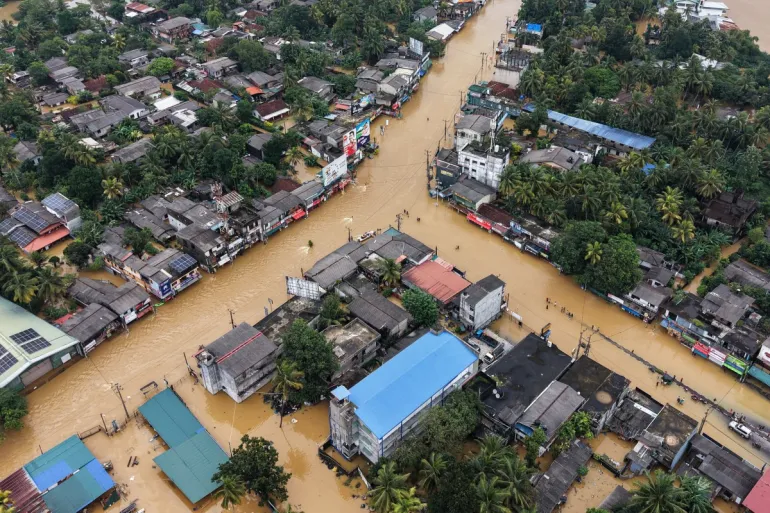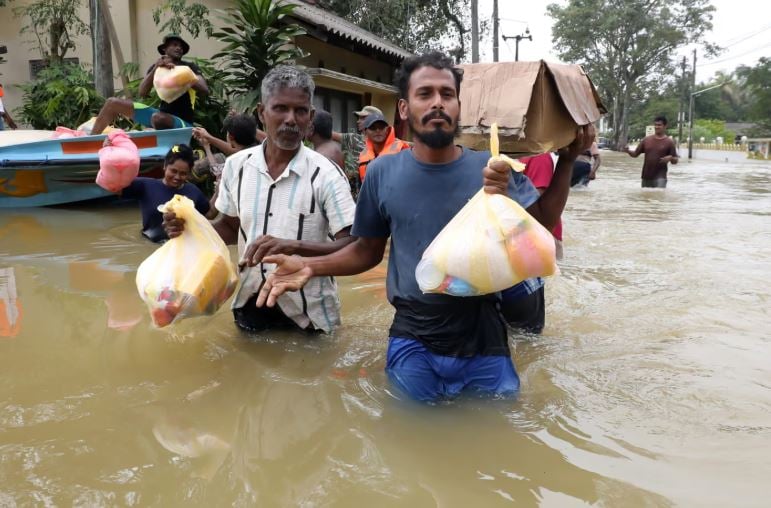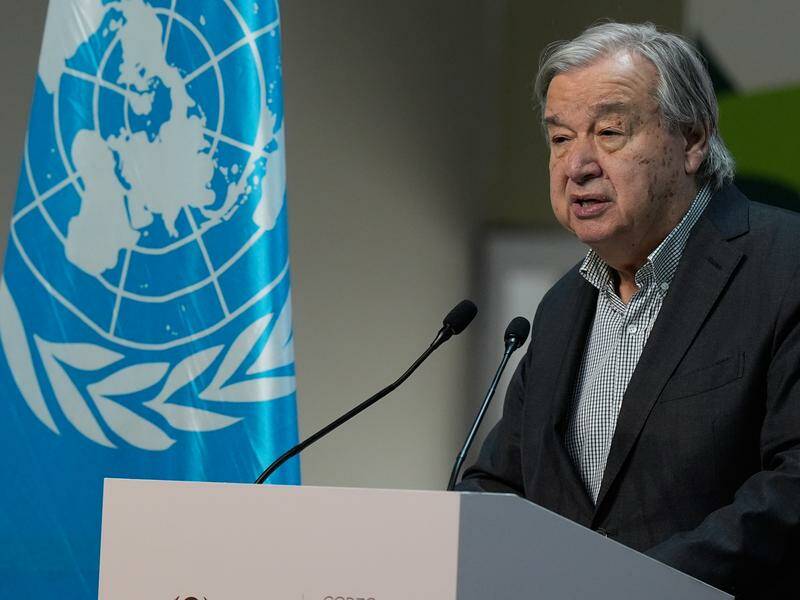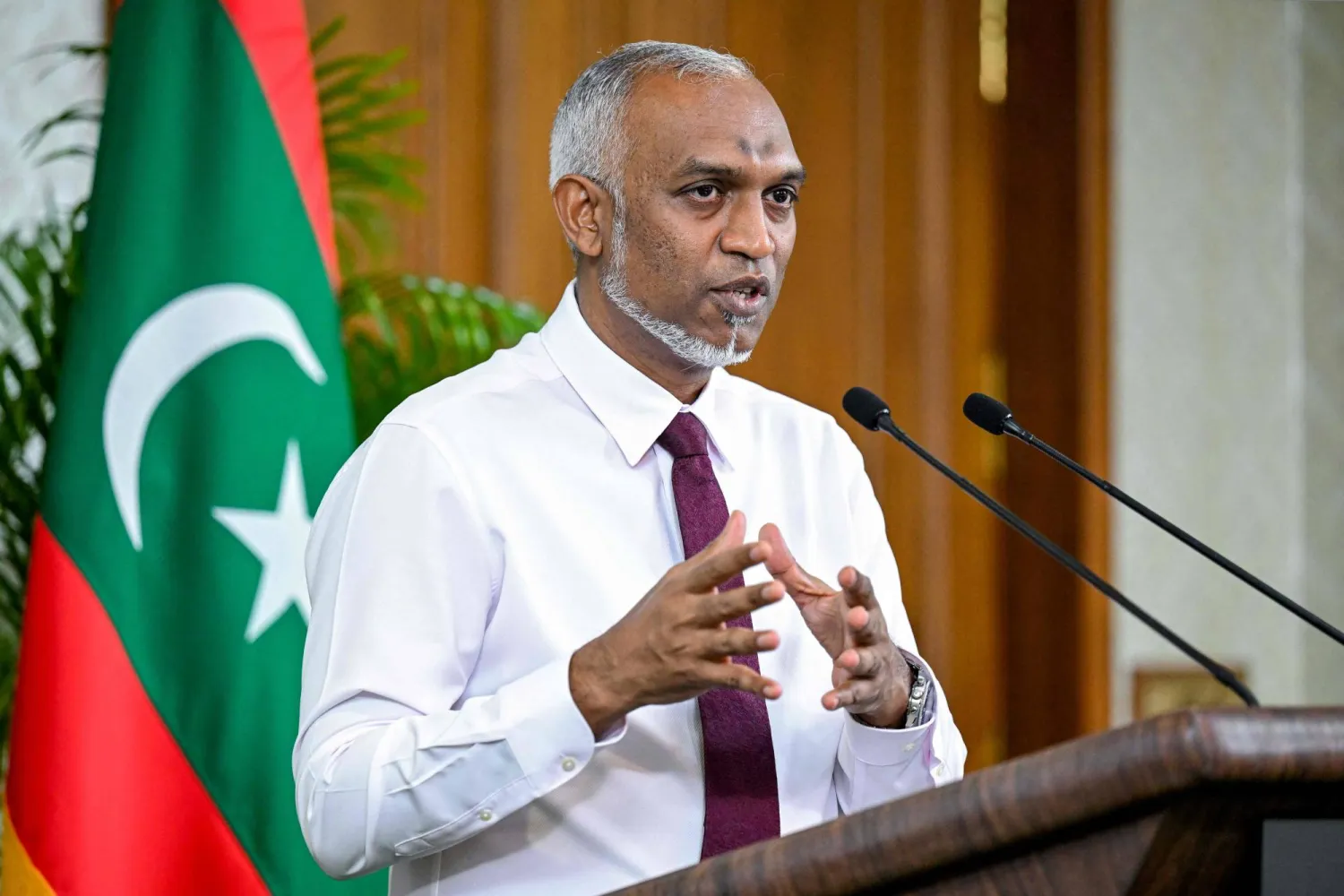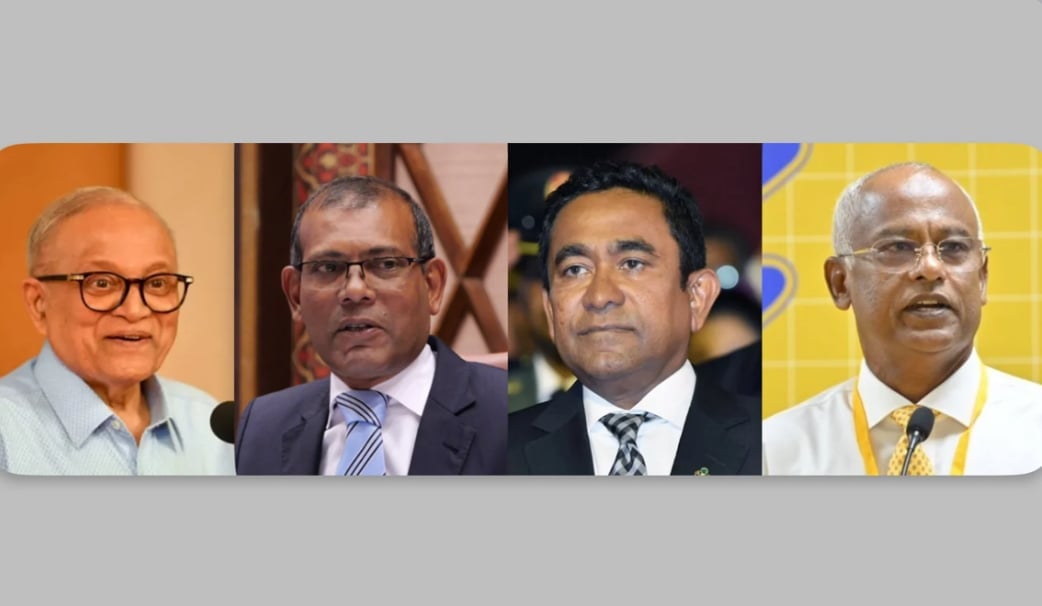The trip to Kochi, India, from December 10, 2022, to January 2, 2023, turned out to be a journey that refreshed memories of Maliku, as if it were a trip to Maliku itself, even though it wasn't. The trip was for the medical treatment of my cousin Dhondhaththaa's daughter. Her mother (my aunt) also accompanied us. My connection with Maliku going back a long time links this trip to Maliku.
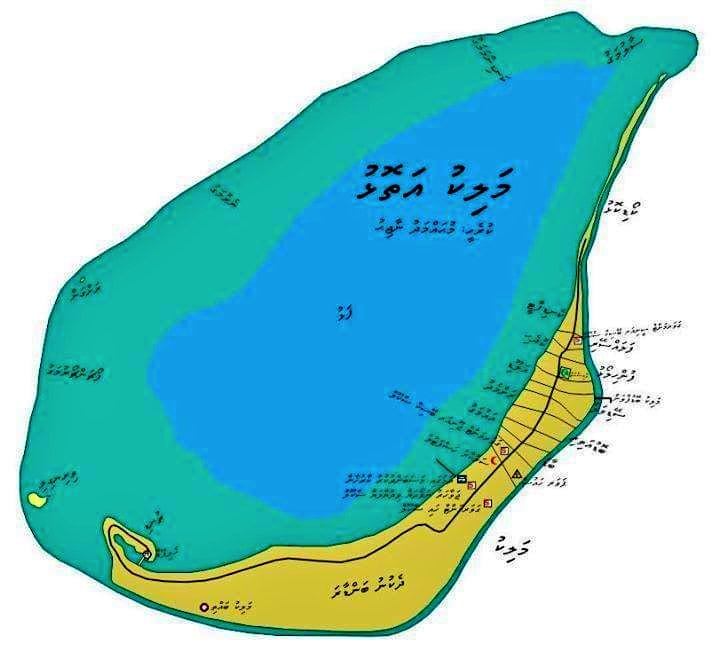
My connection with Maliku dates back to around 1993/94, when I was studying at Majeediyya School. I began learning about Maliku through the Faiythoora Journal published by the National Center for Linguistic and Historical Research. This sparked an interest based on information gathered by Abdullah Sadiq and Abdullah Farouk Hassan during their visit to Maliku in 1990. Since then, I have been collecting various information about Maliku and researching the island and its inhabitants. In the process, I have met and befriended different people from there.
The first person from Maliku I met was Edhurukaagé Mohamed (Maliku Mohamed), who worked in Male' from the 1990s to the 2000s. I met him around 1999. Through the friendship with Maliku Mohamed, I obtained a telephone directory of Maliku and contacted many people, forming friendships. One such person I befriended was Kolhugegé Mohamed, also known as KG Mohamed, who provided much information for the articles about Maliku written by Abdullah Sadiq and Abdullah Farouk Hassan in Faiythoora.
Before the friendship that developed through the telephone directory with KG, in the early 2000s, a simple website about Maliku was created by Gobolhigóthi Husainko and Kanakkufulégé Nazeer Manikfan, and a friendship developed between them through email. In or around 2003, I became friends with Muraedhugan'duvaru Dr. Muneer Manikfan, a Maliku medical doctor who came to work in the Maldives. In the same year, Athirigóthi Kadeeja Manika and her husband Kandamaathugóthi Mohamed, and Alimaalimeegóthi Fathima Manika, along with their children, made a trip to Male', where friendships were formed that continue to this day. Following that was Muraedhugan'duvaru Ali Manikfan, a polymath who was awarded the Padma Shri, one of India's most prestigious awards. We became close friends as a result of his visits to Malé, and he continues to be an invaluable source of knowledge.
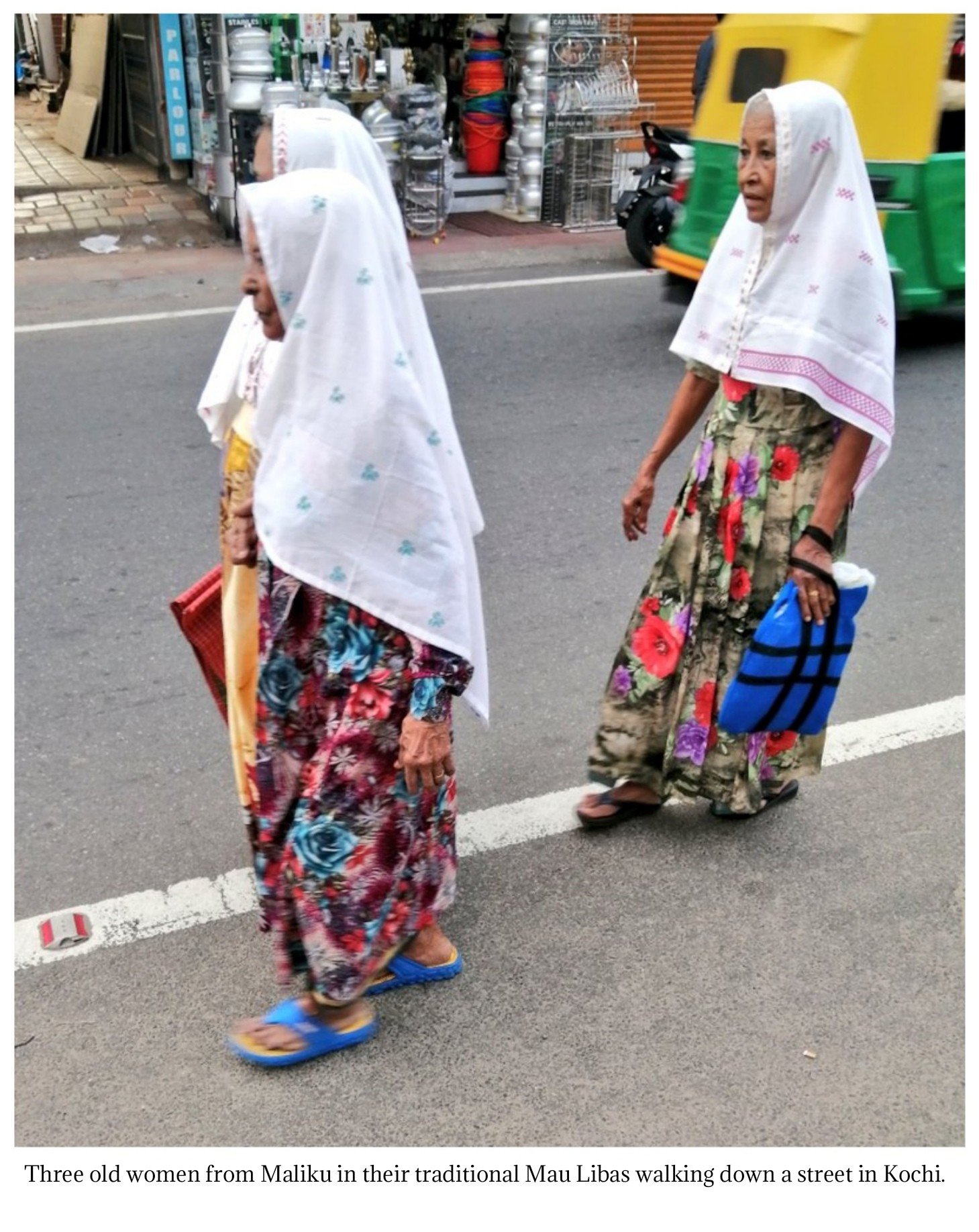
In addition, through social media, trips to India, Maliku, and from Male', close friendships have been formed with many people from Maliku. Among the notable individuals in this regard are Athirigóthi Rashad, his wife Fathuma, Athirigóthi Azeez, Fengennagóthi Mohamed (FG), Kirubuigóthi Ibrahim Maulavi, Hasanbébegóthi Saleem, Muraedhugan'duvaru Ibrahim Manikfan, Nakathorhigé Dr. Khairunnisa (the first PhD holder from Maliku), Olhudhugóthi Ibrahim Manikfan, Olhudhugóthi Hussain Manikfan, Ibrahim Manikfan of Naibuge, his son Nabeel Manikfan, and Bodugan'duvaru Nizam, Aloodigan'duvaru Ajmal. Even though not all names are mentioned here, there are many more close friends in Maliku.
When discussing Maliku, I believe it is important to briefly explain what Maliku is and its connection to the Maldives and India. Maliku is a small atoll located about 70 miles north of the Maldives. The official name for Maliku in India is Minicoy. This is a change that came about due to cartographers of ancient times mistakenly writing the name of Maliku as Minicoy, which then made its way into English documents. The Maliku people and Maldivians still call the island Maliku. Although referred to as an atoll, it consists of a single reef, similar to Kaarhidhoo. The entire atoll comprises only two islands: Maliku, which stretches along the length of the atoll, and a very small island called Virin'gili. There is also a sandbank called Raggan. Maliku is a large island, approximately 11 kilometers long with an area of 4.8 square kilometers. In terms of land area, it is roughly the same size as Fuvahmulah. The population is also similar, at around 12,000 people. The physical characteristics of the people, including their appearance, color, height, and features, are identical to those of Maldivians. Their language, culture, and customs are also the same. Due to a long period without contact with the Maldives and its connection to mainland India, some influences, especially from Kerala, have seeped in. This is more noticeable among the youth and middle-aged population, while the elderly retain more Maldivian characteristics.
Throughout history, Maliku was under Maldivian rule at various times, most recently until 1752, when Ali Raja of Cannanore conquered the Maldives and took control of Maliku too. After less than 4 months, the Maldives was liberated from Ali Raja, but Maliku remained under their rule. Later in 1790, when the British East India Company took control of most of the countries in the Indian subcontinent, Ali Raja was allowed to administer Maliku in return for a tribute to the East India Company. In 1858, suzerainty over Maliku was transferred from the East India Company to the British Crown in the person of Queen Victoria. However, Ali Raja's full control over Maliku was lost in 1905. From 1905, Maliku was governed under the Malabar District of Madras Presidency of British India. When Pakistan and India gained independence in 1947, Maliku became part of the Republic of India. However, until 1956, when Maliku became part of the Union Territory of Laccadive, Minicoy, and Amindivi Islands, there was direct travel and close ties between the Maldives and Maliku. After 1956, when the border between the Maldives and Maliku was closed, these connections weakened, and subsequent generations lost knowledge of each other. The linguistic and cultural ties also began to change.
Today, Maliku is an island in the Union Territory of India called Lakshadweep. The only way to reach Maliku is through the port of Kochi in India. Therefore, when Maliku people come to the mainland, they mostly stay in Kochi. The Kaloor area of Kochi is where a large number of Maliku people reside. Maliku people have also settled in other areas of Kochi, other parts of Kerala, and some other regions of India. Since they are Indian citizens, there are quite a few Maliku people who have bought properties and live in these places. It is estimated that approximately 3000 Maliku people stay in Kochi.
As mentioned earlier, my trip to Kochi was for medical treatment. Therefore, the majority of the time was spent on that. During the free time, I met with Maliku people in various parts of Kochi, especially in the Kaloor area. My longtime friend KG Mohamed, who resides in Kochi, acted as a guide. We were originally scheduled to travel on December 6th. However, due to unforeseen circumstances, we had to postpone the trip to December 10th. The reason for choosing the 10th was to attend a Maliku couple's wedding ceremony in Kochi. Unfortunately, we missed the ceremony as we failed to check the time on the invitation card and arrived in Kochi after it had ended. The ceremony was held at noon, and we reached our hotel around 9 PM.
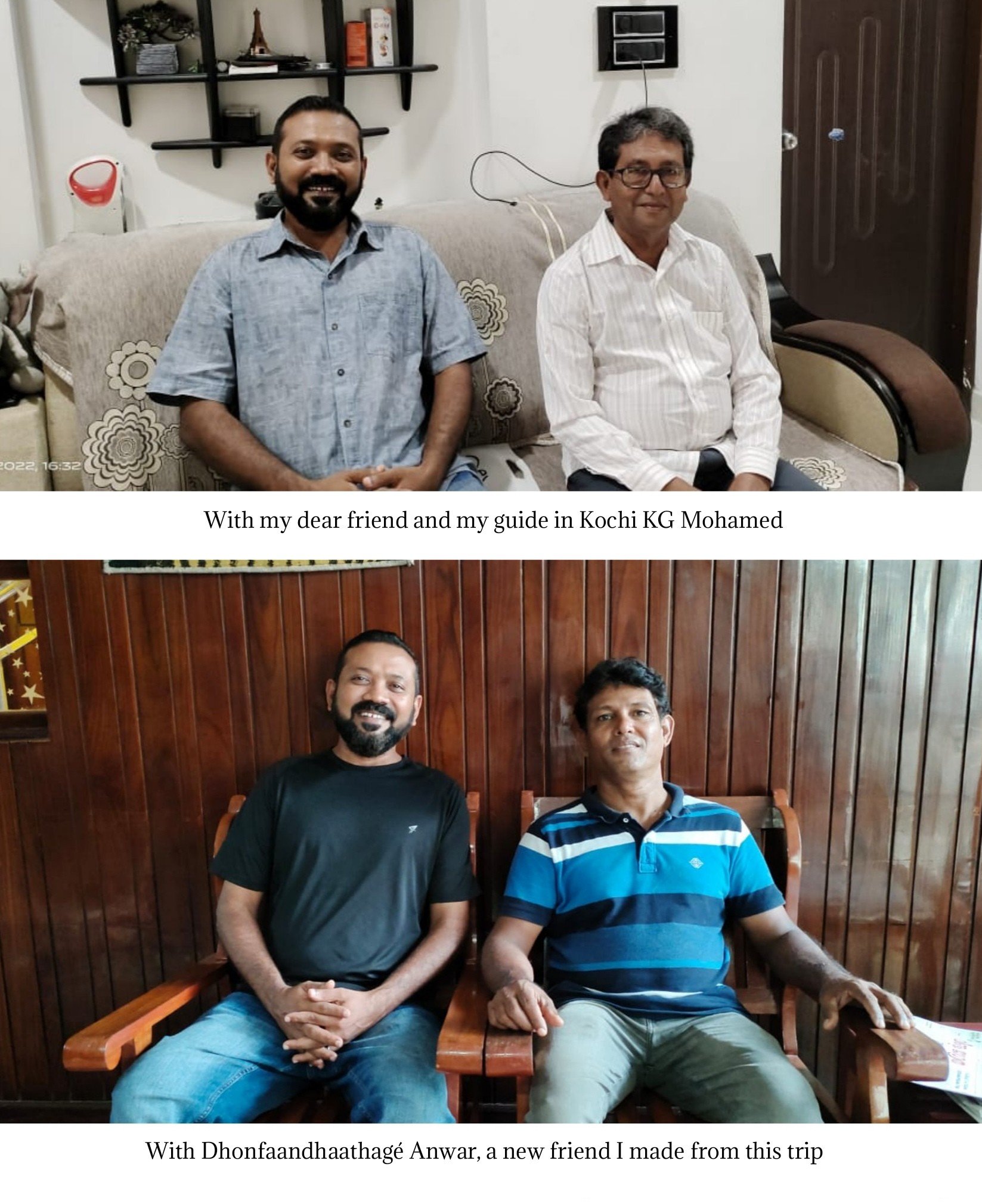
That day, we were picked up from the airport by Dr. Muneer Manikfan and KG Mohamed, who are among the closest friends from Maliku. They came in two separate cars. Muneer came with his son Samah. KG's car was driven by Dhonfaandhaathagé Anwar, with whom I developed a friendship during this trip. From the airport, we first went to Muneer's house in Aluva. There, we met Muneer's mother, his wife, Aloodigothi Sakeena, and three of his four children: Samah, Shaima, and Shafin. Muneer's eldest daughter, Maleeha, was studying in Coimbatore. We had tea at Muneer's house before heading to our hotel. We stayed at Hotel Matha Residency near Amrita Hospital, which is mainly frequented by Maldivians. There's also a restaurant specializing in Maldivian cuisine on the ground floor of the hotel.
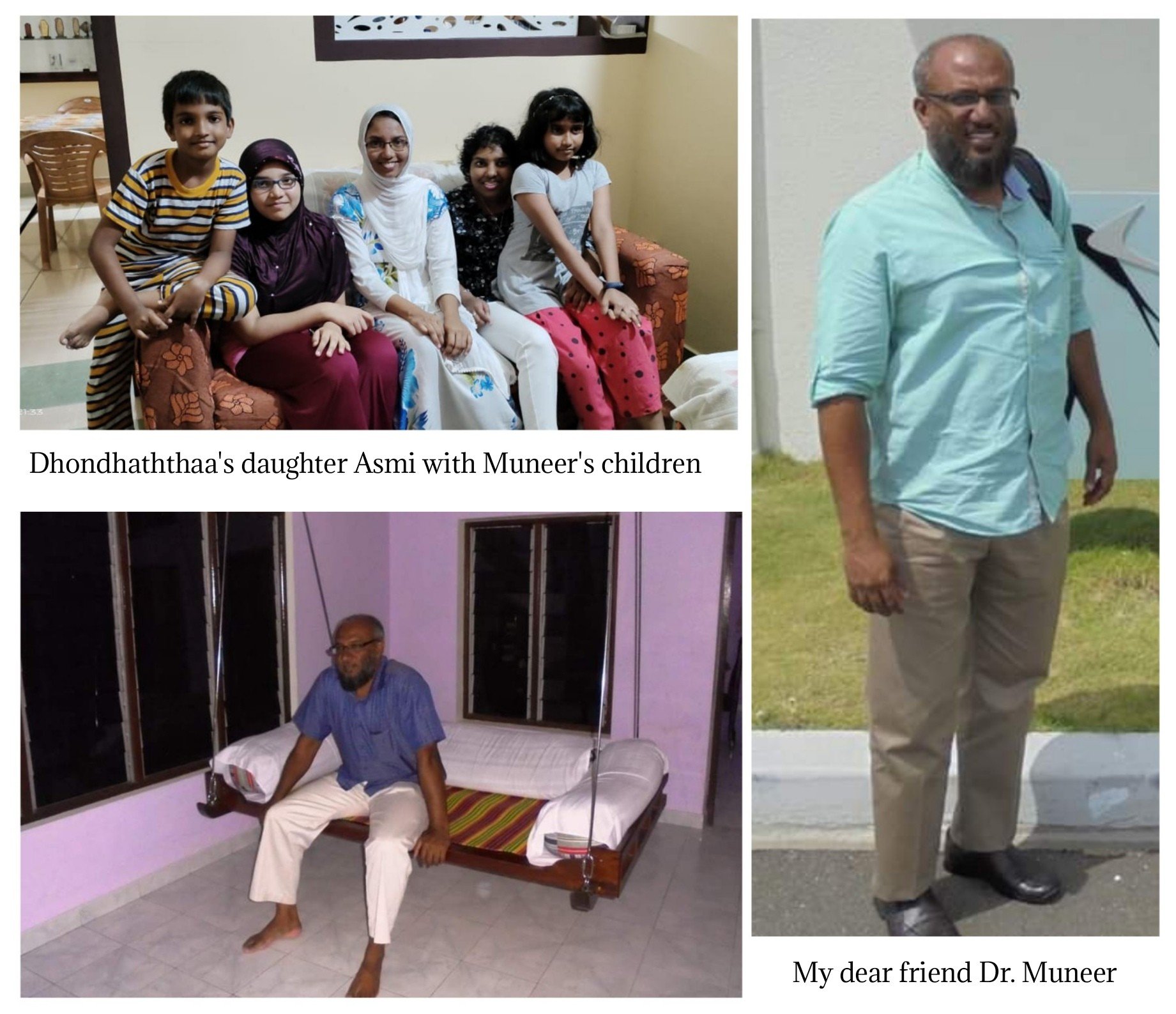
The next day at noon, Athirigóthi Kadeeja Manika and her husband Kandamaathugóthi Mohamed, who are among my closest friends from Maliku, brought some of Malik's special dishes, including Maliku Faraataa, Raiy Riha, and some other food items. Maliku Faraataa is a special faraataa that Malik people have been making for a very long time. It is a delicious, square-shaped faraataa. Unlike regular faraataa, it has less oil. Raiy Riha is also a special spicy curry from Maliku. During the trip to Maliku in 2015, almost every morning for breakfast, at Athirigóthi I was provided Maliku Faraataa and Raiy Riha. There were other varieties as well. Raiy Riha is similar to the Kulhi Riha commonly made in the Maldives now. This curry, made with ground dried chili, is very delicious.
Afterwards, since it was Sunday and there was nothing scheduled at the hospital, we went to Dr. Muneer's house. We returned to the hotel after having evening tea and dinner at Muneer's place. We had once again experienced the delicious snacks and savoured the tastes of Maliku's traditional Maldivian cuisine that we had tried before. We spent another day at Muneer's house after that.
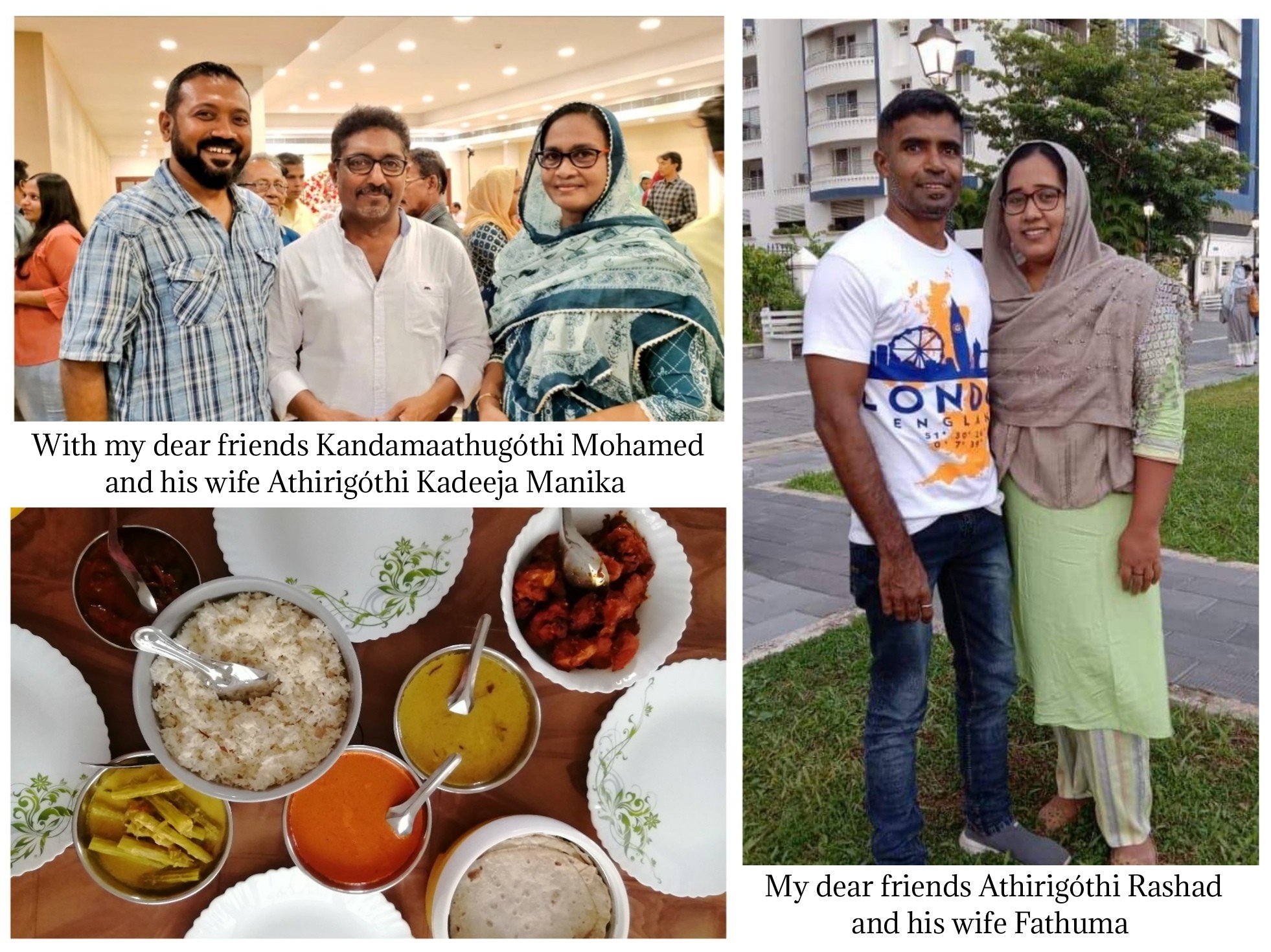
The main part of the trip, especially the morning and afternoon hours, was spent on medical treatments. The evening and night hours, as well as Sunday, which is the weekend, were dedicated to visiting and meeting with various friends of Maliku at their homes. On the second Sunday, the day was spent at the apartment where Athirigóthi Rashad and his wife Fathuma live. This apartment is on the ground floor of the building where his sister, Athirigóthi Kadeeja Manika, also resides. Kadeeja's family lives on the upper floor. Kadeeja's family and Rashad's family had prepared a delicious lunch for us. It was all traditional Maldivian-style cuisine from Maliku. There was Dhirifiyaalee Baiy (a type of rice), Maliku Faraataa served with Huiy Barhi Riha (a local Maliku brinjal curry), Raiy Riha, Muran'gatholhi Kirudhiya (a Maldivian-style drumstick curry), Mas Riha (tuna curry), and fried chicken. The flavors were not unfamiliar, but rather a very Maldivian and delicious. After lunch, we spent the rest of the day until night at that house.
Dinner was scheduled at an apartment in "Ismail Makaan," a private residence owned by the Dhaathifaanungóthi people from the Kudhehi Avah of Maliku. One of the people I befriended during my trip to Maliku in 2015 was Kan'bógóthi Moosa Manikfan. He is commonly known as Kan'bó Bappa. During that trip, I also met and became friends with his children, including Leyndhurangan'duvaru (LG) Ibrahim Manikfan and Hanifa Manika. He prepared and served me delicious traditional Maldivian food at his home. During this recent trip to Kochi, while I was here, I learned that Kan'bó Bappa had also come to Kochi for a hernia surgery. When I called Hanifa, his daughter, they invited us for a meal at their rented apartment in Ismail Makaan. So, after staying at Rashad's house, we went to Kanbo Bappa's apartment for dinner. They had prepared a traditional Maldivian meal, similar to what I had in Maliku. This meal is called 'Kiraaibaiy'. It consisted of rice, Masfen (tuna water made in coconut milk), Forippi Rihaakuru (specially fried Rihaakuru), fried baitfish, fun'disatani, and green pea curry. It was very Maldivian and equally delicious. Our friend Kan'bó Bappa is now over 80 years old and was formerly a fisherman. Even when I visited Maliku in 2015, he was still going fishing on the Athirigóthi Laanchi (fishing boat). On November 19th of last year, his son Leyndhurangan'duvaru (LG) Ibrahim Manikfan launched a 55-foot fishing boat named 'Karanfoo'. Although Kan'bó Bappa doesn't go fishing anymore, he now handles all the net-making work needed for the Karanfoo boat.
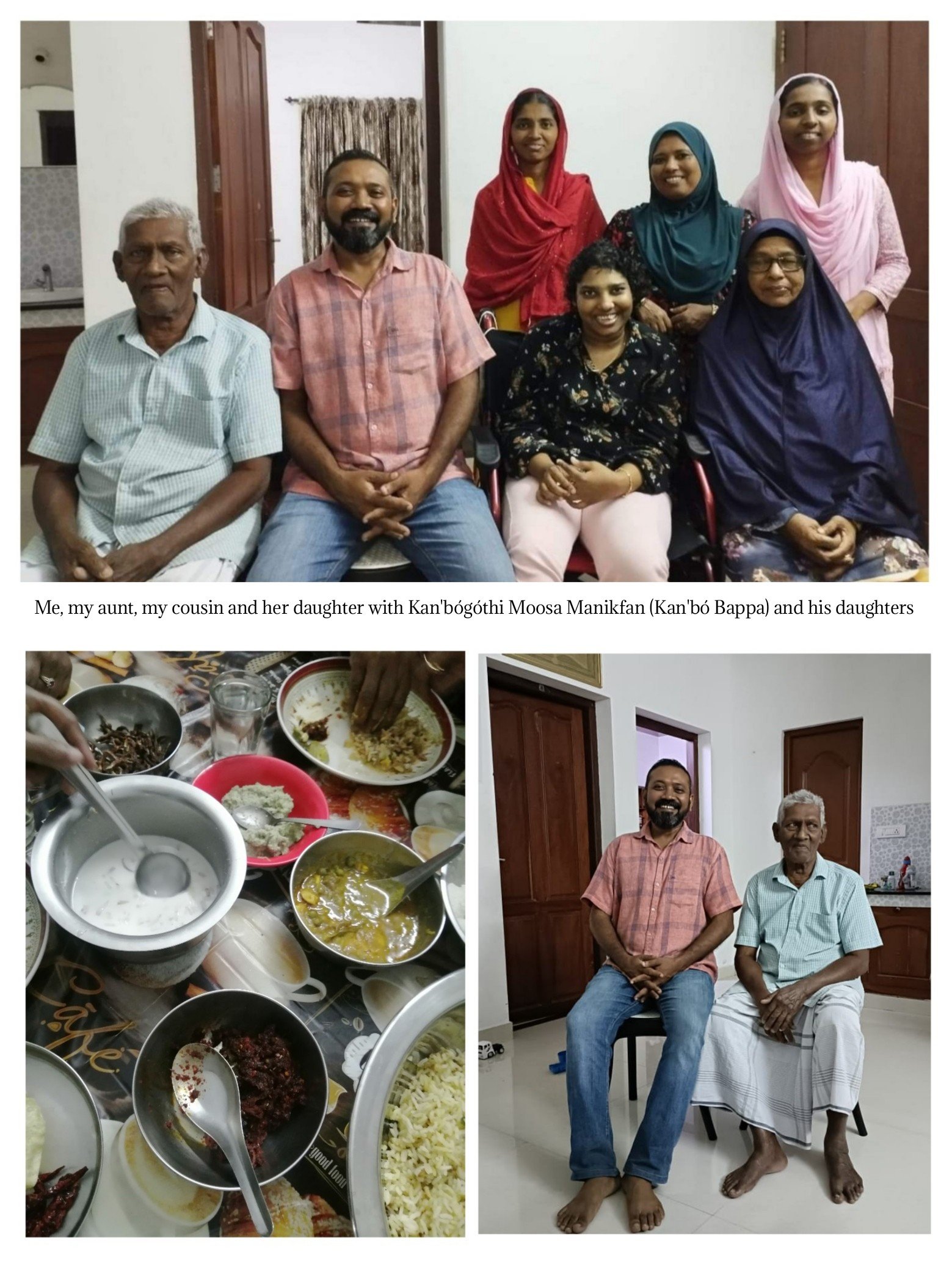
One of the special people encountered during the Cochin trip was Ibrahim Kudahaajigóthi, a retired folk dance master. He received training in that field from the mainland and went to Maliku, becoming one of the foremost people in reviving and promoting cultural dances in Maliku. We also met during the 2015 trip to Kochi to go to Maliku. Both times, the visit to his house was under the guidance of KG Mohamed. One of the key figures who played a leading role in reviving the extinct cultural dances in Maliku alongside dance master Ibrahim was KG. Another person involved in this was the late Maugasdharhugóthi Maulavi Ali Ismail Umari, a former Katheeb of Maliku who was among the island's religious scholars. Ban'diya dance and Lava Beru are two dances that have been revived through the tireless efforts of these people from among the extinct cultural dances of Maliku.
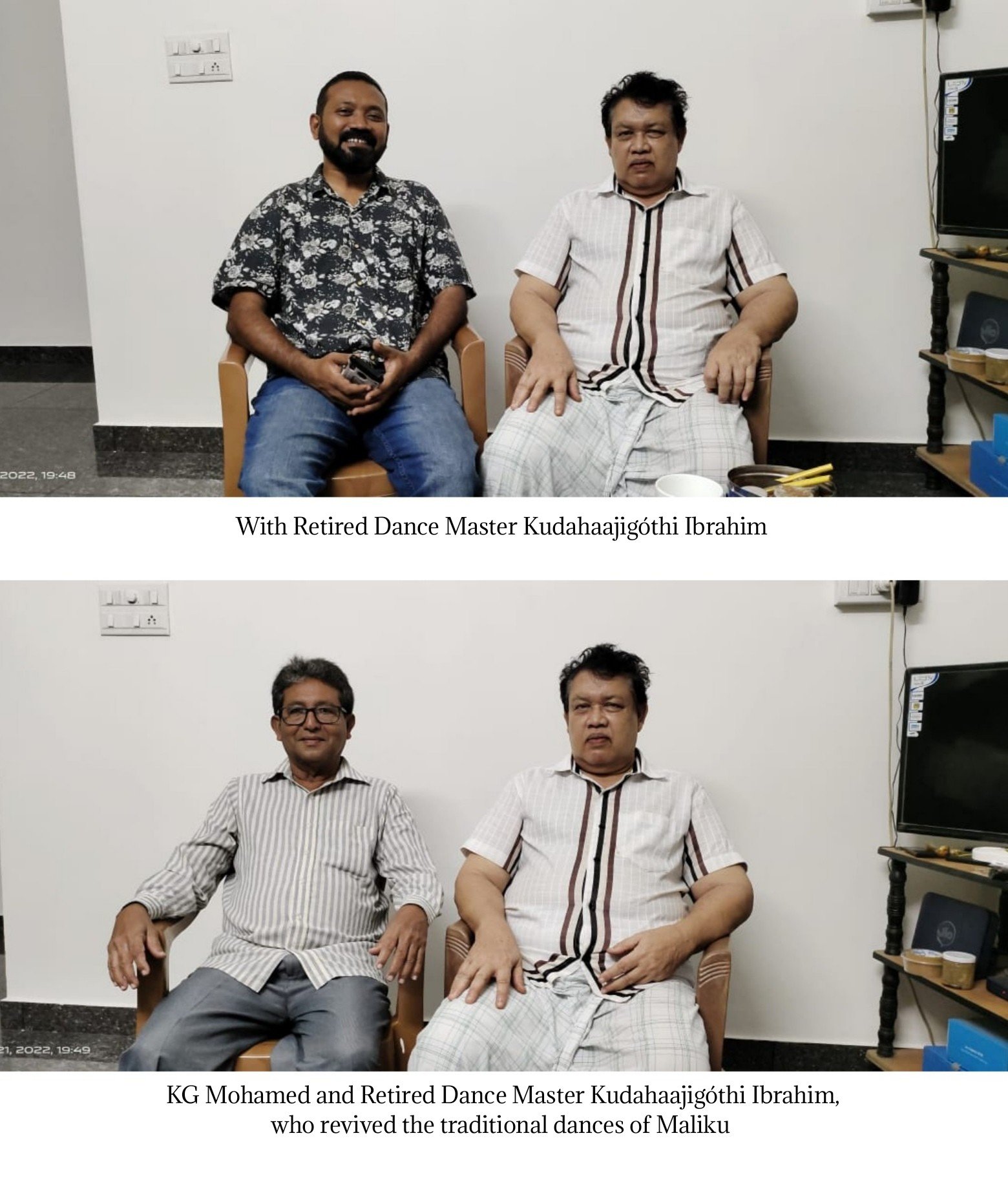
Many people would have noticed the reference of a FG or Fengennagóthi Mohamed in my writings on Maliku. I had known about FG Mohamed since I was a child. Abdullah Farouk Hassan mentions him in his articles about Maliku in the Faiythoora Journal. In addition, when I was in school in the 1990s, I saw FG Mohammed play the lead in a Maliku film that aired on Television Maldives. The film is named "Natheejaa" and was produced by Maliku Mohamed (Edhurukaagé Mohamed who also worked in the film industry in Male'). Although I knew FG in this way, we became friends years later over social media. I met him for the first time in person on my trip to Maliku in 2015. Since then, he has been one of my best friends among the people of Maliku. FG retired recently from his job as an Information Assistant and Photographer at the Lakshadweep Publicity Department in Maliku. FG and his wife lived in Malappuram, which is around 160 kilometers from Kochi, when I visited Kochi. His daughter, Dr. Maimunnisa, an eye expert, worked at a specialised eye hospital there. When he heard about my arrival in Kochi, he came by morning bus on Sunday, the weekend. It's about a 4-hour trip. He visited Kochi twice while I was there, accompanied by his wife, daughter, and granddaughter. FG is the person that provides Maldivians with the most up-to-date news on Maliku and Lakshadweep in Dhivehi on Facebook.
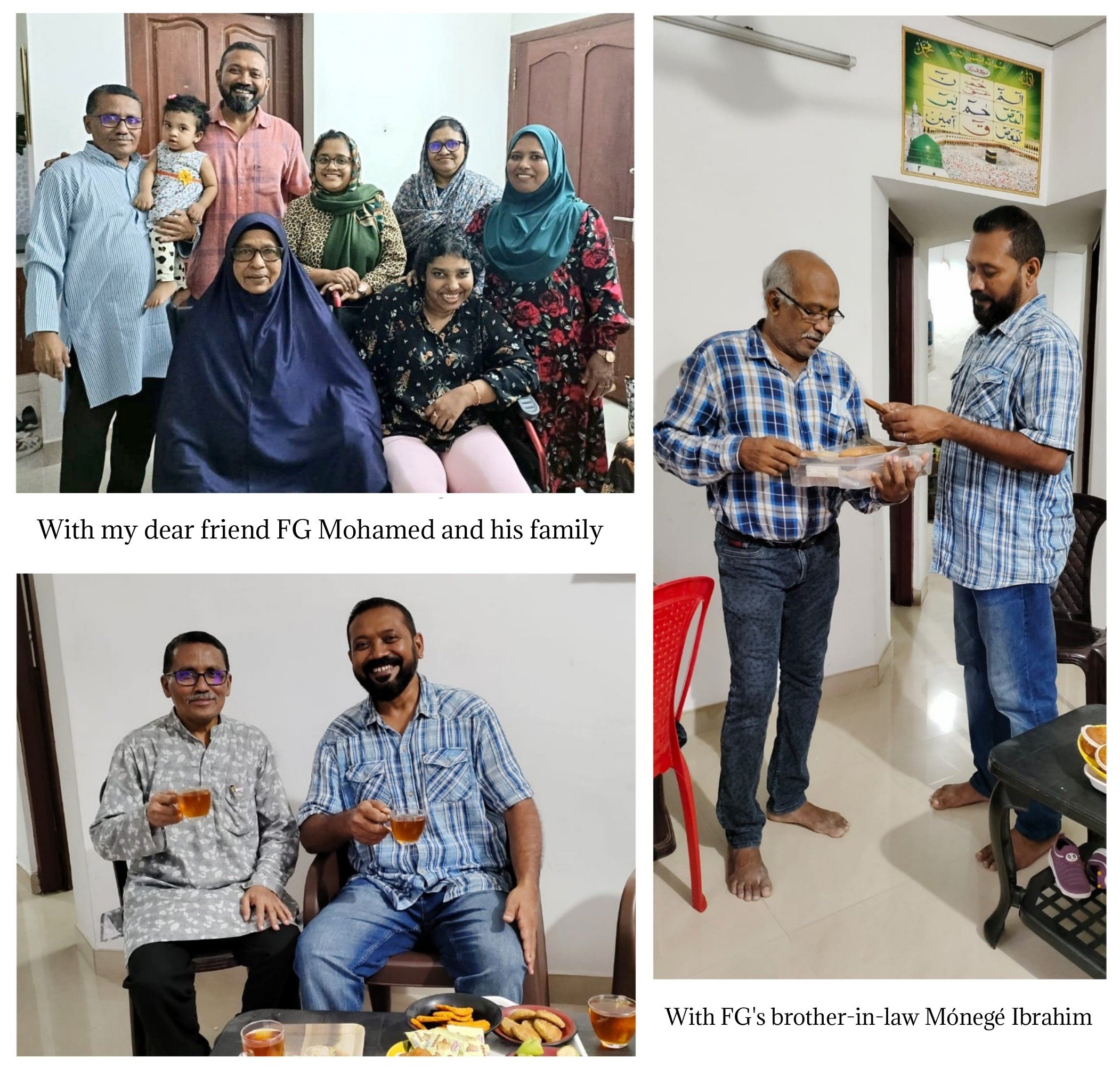
One day during the trip, while riding a motorcycle with Rashad in the Kaloor area of Kochi, I saw a restaurant with its name written in the Thaana script of the Dhivehi language. It was written as 'KFG Cafe and Restaurant'. When asked who owned the restaurant, it was said to be run by people from Kaafógóthi in Baada Avah, Maliku. KFG stands for Kaafógóthi. Located on Deshabimani Road in the Kaloor area, not far from Karukappalli Junction, this restaurant offers Maliku-style cuisine prepared according to their tastes, available from evening onwards. Various delicious drinks are also available. The most unique special drink I found was Gulkan'dhu Boost. It's a cold drink made by adding gulkan'dhu (sweet preserved rose petals) to a chocolate malt drink called Boost. One evening, after staying at Rashad's place, we went there for dinner. We ate Maliku Faraataa, beef curry, onion rice, and grilled fish. It was very delicious. A new friend I met there was Karaagé Moosa, who is married to a woman from Kaafógóthi. I visited the place two more times after that. On one occasion when I went with KG, I met Nasir, the famous Maliku singer whom I had befriended earlier. Nasir frequently visits the Maldives. The most recent visit was during the last Eid celebrations.
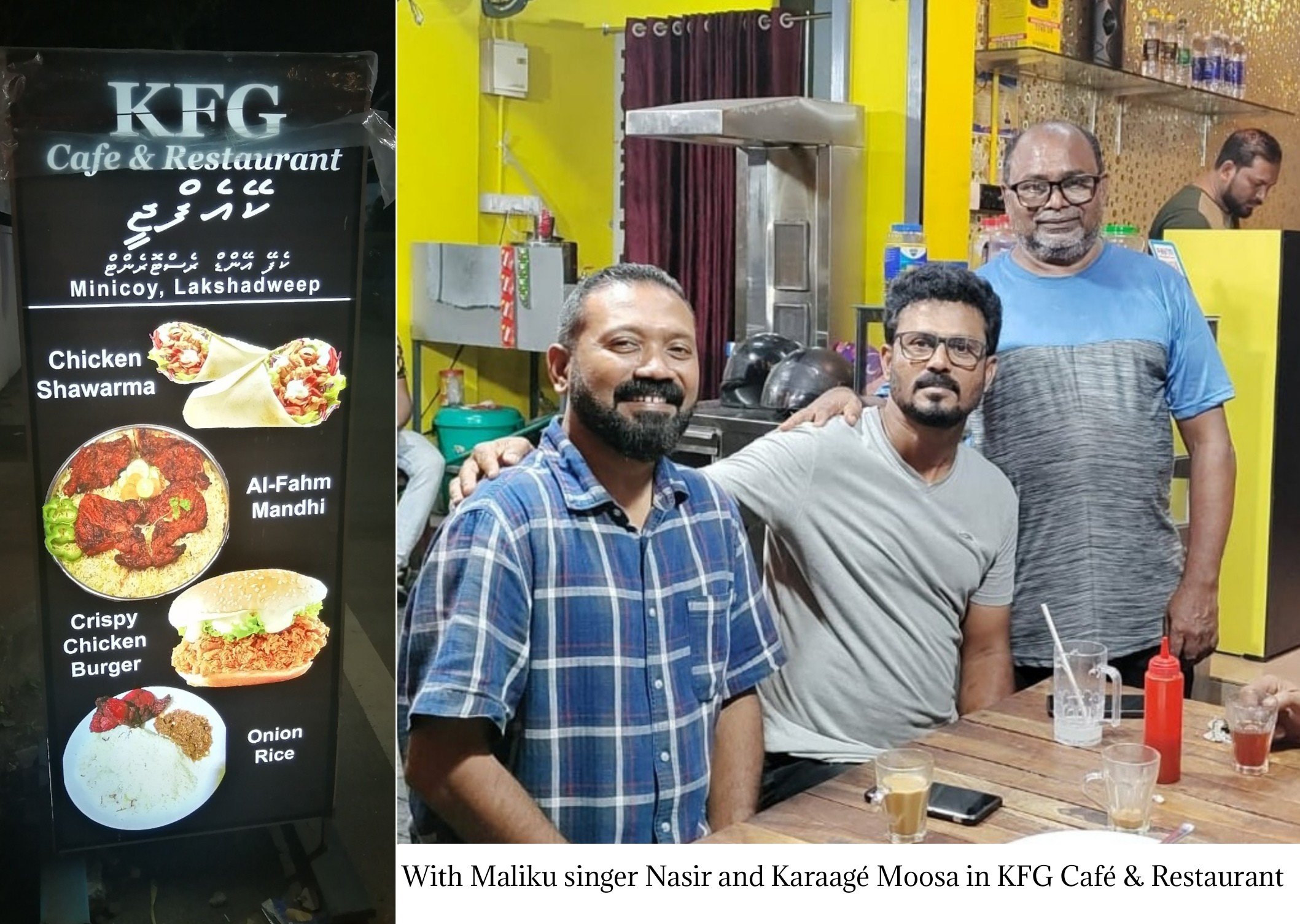
One night while at KFG Restaurant, I met Asleema, a friend I made in Male'. Asleema was a teacher at the Peace School run by my friend Dr. Muneer in Maliku. I was responsible for managing the activities of the teachers who were brought to Male' for a special Dhivehi language training program for that school's teachers. This was made possible with financial assistance from many well-wishers. A very close friendship developed with all the teachers who participated in that trip. In our chat after seeing Asleema, she invited me and my family to dine at her home. When we went to find her place, we discovered that she was living on the first floor of KG's house, with her mother, father, and little child. Because my cousin's daughter had trouble walking, dinner was held downstairs in KG's apartment. It was an extensive dinner with many different Maliku flavours. Following the dinner Asleema gave at KG's residence, KG prepared a delicious chicken and tuna biryani and delivered it to our hotel the next day for lunch. My aunt and cousin said it was far more excellent than the biryani served at hotels and restaurants.
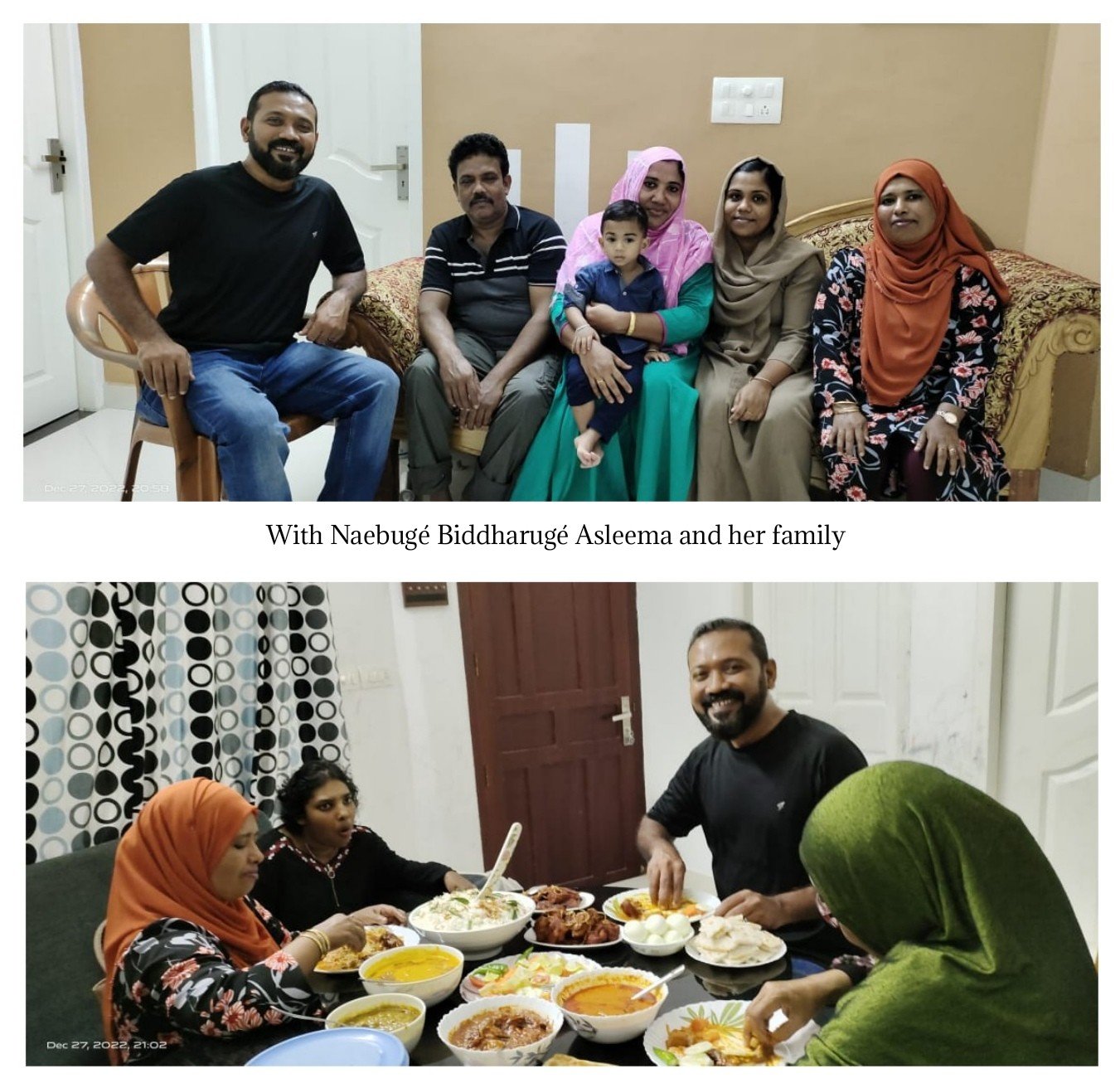
One of the special personalities encountered during this Kochi trip was Kadhdhaifaanungé Husain Manikfan, the blind singer from Maliku. KG took me to visit his house as well. The house belongs to a friend I knew before, Hasanbébegóthi Mohamed. Husain Manikfan is the younger brother of his father-in-law, Kadhdhaifaanungé Mohamed Manikfan (Kudabe). The paternal grandfather of these two brothers was from Addu Atoll, Maldives. Since both of them were born long after their grandfather had passed away, they don't know much about him. Their maternal grandfather was from Nicobar. Through KG, we learned that Husain Manikfan is a very good singer, and with his permission, we recorded two songs on my mobile phone. The first song he sang was "Kaaboa thakethi libeythee huregen meedhau hifumah bulhaleh naudhey..." (With food available, cats doesn't come to catch mice...) is a song KG composed long ago. It was made in connection with the excessive food waste by Maliku people at that time. He sang it fluently until the end, even though KG himself had forgotten it. It's a very meaningful and excellent song. The second song, "Aakhiruvi zamaanah mi dhuniye kaerivaneethaa, Dhajjaaluge nulafaa aniyaa faalhuvaneethaa" (the world nears the end times, Dajjal's evil oppression becomes apparent...), is a song that was broadcast on All India Radio in the past. The song was composed by the late Maliku poet BA (Baugé Athirigé) Ibrahim Manikfan. During the 1990 Maliku trip of Abdullah Sadiq and Abdulla Farouk Hassan, they also had this Husain Manikfan sing while sitting on the on'dhoali (swing bed) at Kadhdhaifaanungé.
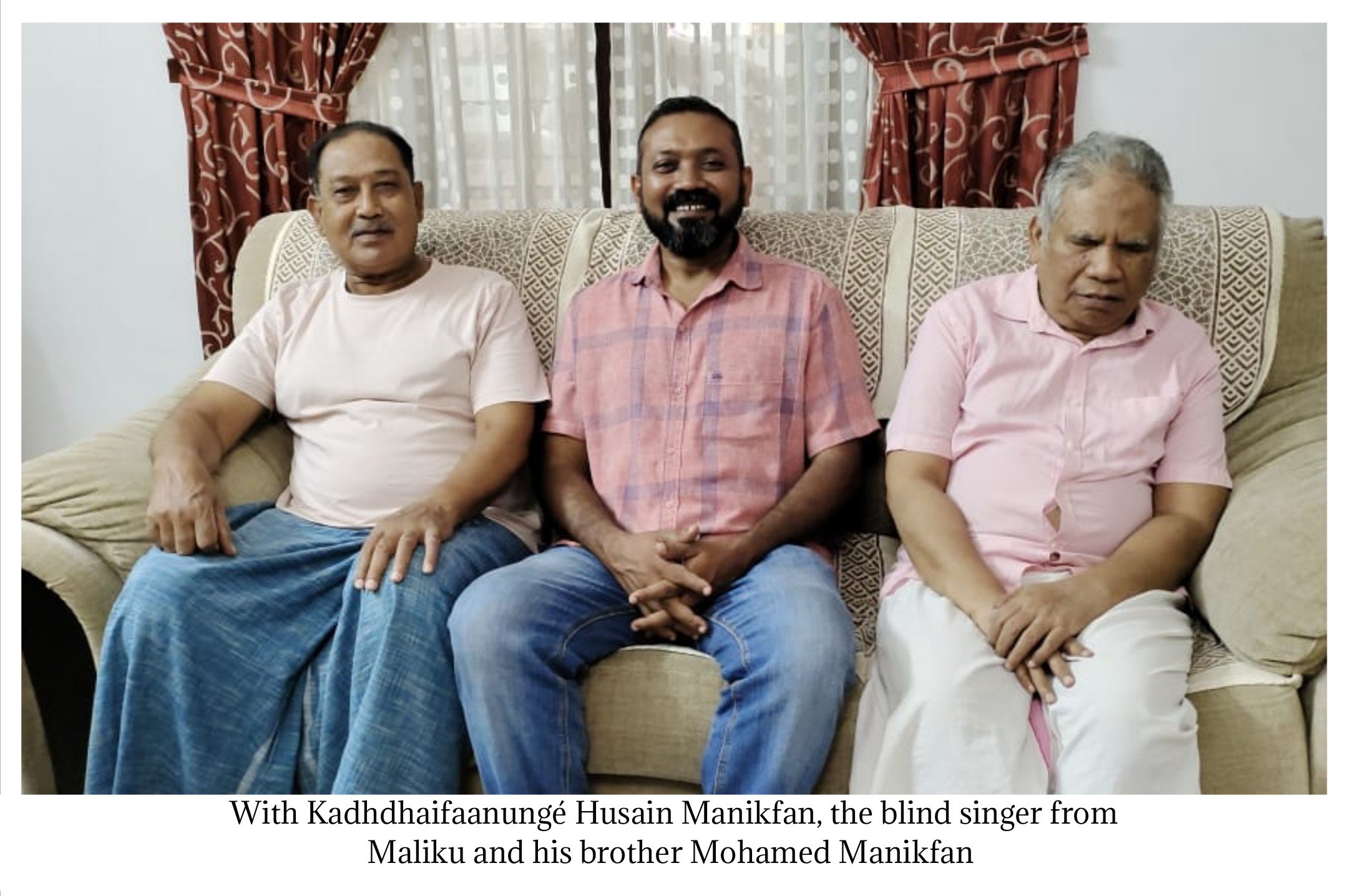
Undoubtedly, the most special personality among Maliku's close friends is Muraedhugan'duvaru Ali Manikfan, who has been awarded the Padma Shri, the fourth highest civilian award given by the Government of India. Born on March 16, 1938, Ali Manikfan is not someone who has been educated through a formal educational system. However, he is an expert in many fields of knowledge. He is a marine scientist, an environmentalist, an astronomer, and a skilled boat builder. A newly discovered fish has been scientifically named after him. The British explorer Tim Severin used Ali Manikfan as the master carpenter to build a ship similar to the one Sindbad is said to have traveled in. He has invented an Islamic lunar calendar that can be uniformly followed by all parts of the world. According to his calendar, special days like Ramadan, Eid, and Hajj would fall on the same day throughout the world. He has advocated for this for about fifty years.
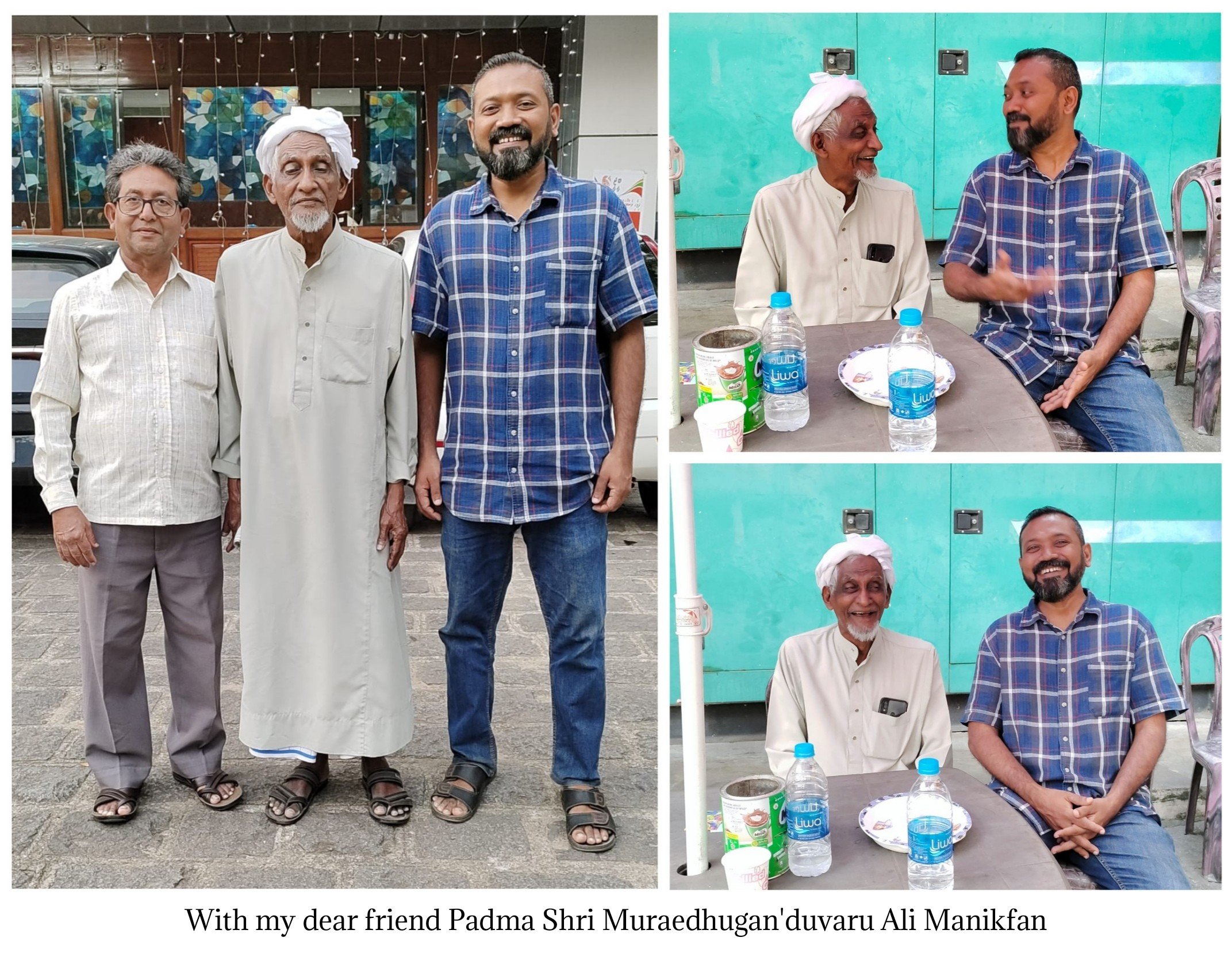
I first met him when he came to the Maldives around 2007 to meet with relevant authorities to advocate for this cause. On that occasion, I arranged for him to meet with the President of the Supreme Council for Islamic Affairs, Sheikh Mohamed Rasheed Ibrahim, and other relevant parties. Later in 2009, when he came to Malé for the same purpose, I again arranged meetings with relevant parties. This included meetings with the then Islamic Minister, the late Dr. Abdul Majeed Abdul Bari, members of the Astronomy Committee, and other senior officials of that ministry. At his request, I typed and distributed a handwritten document he had written in Thaana script about the Hijri calendar to all relevant institutions in the Maldives.
Ali Manikfan has visited the Maldives several times since then. On one occasion, I even sent him to my native atoll, Addu. The friendship I had with Ali Manikfan is very close. In 2007, when I took my grandfather on a medical trip to Trivandrum, he traveled from Valliyoor in Tamil Nadu, where he was living at the time, to Trivandrum, just to meet me. Then, during this recent trip to Kochi, even at the age of 84, he traveled from Kozhikode with his stepson to meet me at our hotel. That was a great honour for me.
As mentioned earlier, we wanted to attend a Maliku wedding the day we arrived in Kochi, and unfortunately, as we arrived late, we couldn't attend it. But on December 16th, there was a special night feast at the bride's house related to the wedding. In Maliku culture, this feast is called "Echchethi Laandhaa Baiy." I attended this feast with my friend KG. The bride was Aadhangé Asima from Funhilolhu Avah, and the groom was Bandaaragé Mohamed Yasin from the same avah. Here, I met the bride's father, Thileyrugóthi Mohamed, who is the secretary of the "Minicoy People's Welfare Association" established in Mumbai specifically for the seafarers from Maliku. The main occupation of Maliku men is seafaring. Previously, he had served as the Mooppan or Bodukaaka (the Avah Chief) of Funhilolhu Avah.
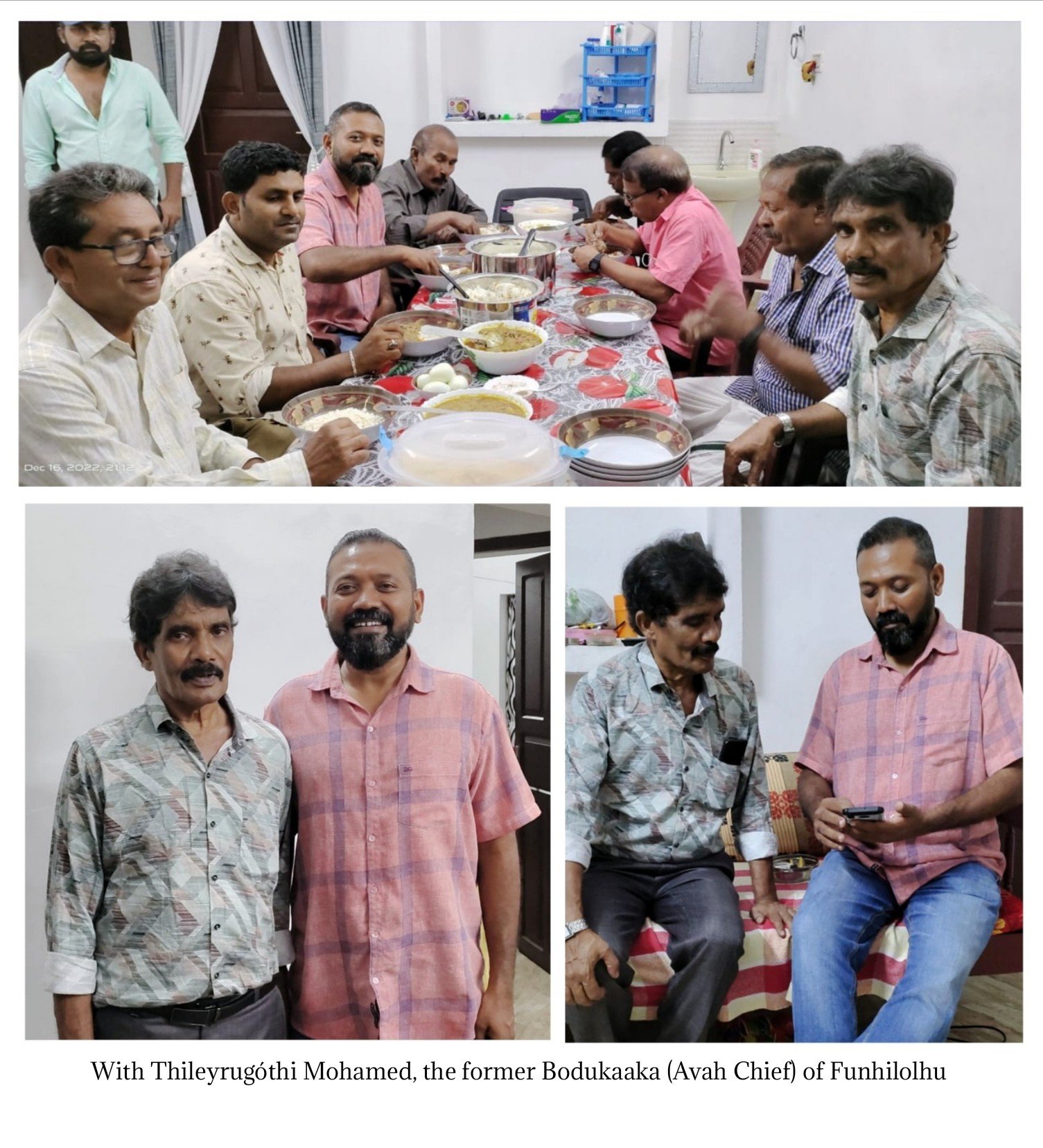
Dr. Ismail, a dentist from Maliku, is a doctor I met in Trivandrum, India, during a medical trip in 2007. One day, while walking on a street in Trivandrum, I saw a sign in the Thaana script that read "Fathima Dental Clinic." Upon entering, I found it was run by a doctor from Maliku. Dr. Ismail was assisted by his wife Rajeena, who is also from Maliku. After 2007, many years passed without meeting Dr. Ismail until last year, when we met again in Male'. He had come to work at a clinic opened in Alifurhi, North Maalhosmadulu Atoll (aka Raa Atoll). During this trip to Kochi, he called one day, saying he was also in Kochi, and invited me to meet at "Hikithavaa." When I went there with my friend KG, it turned out to be a small café run by Alimaalimeegóthi Fathima Manika, whom I had befriended in Male' in 2003. Fathima Manika is educated in civil engineering. She has served as an assistant engineer in the Lakshadweep Public Works Department and has now retired. She has bought a house in Kochi and spends her time running "Hikithavaa." She makes very delicious snacks.
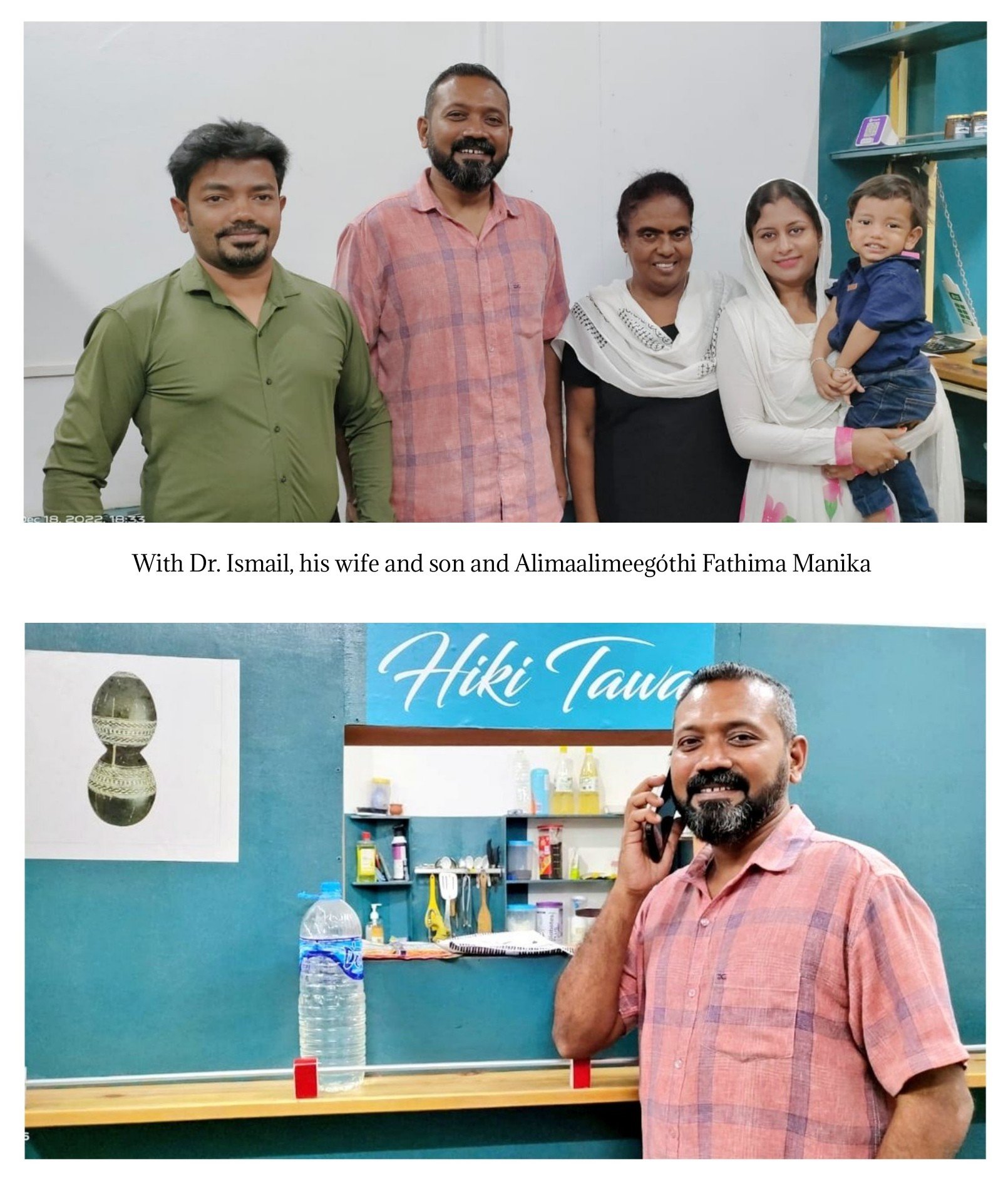
One of my closest friends in Maliku is Olhudhugóthi Ibrahim Manikfan. He is a member of the Maliku "Village Dweep Panchayat" (Maliku Island Council). He is also closely connected to the Maldives. His maternal grandfather Husain Didi is from the aristocratic Kakaagé family of Malé. He has cousins living in Male'. We had previously established a friendship through WhatsApp. We first met in person about three or four years ago when he came to Male' with his wife and two children. Similarly, I have a close relationship with his brother, Olhudhugóthi Husain Manikfan, through WhatsApp. However, we haven't met in person yet. During this trip to Kochi, Husain Manikfan was away on a trip. Ibrahim Manikfan was in Maliku. However, his daughter Kadeeja Manika came to Kochi and sent a gift from Ibrahim Manikfan to the hotel where I was staying. Later, along with my friend KG, we visited the house where Kadeeja and her husband live.
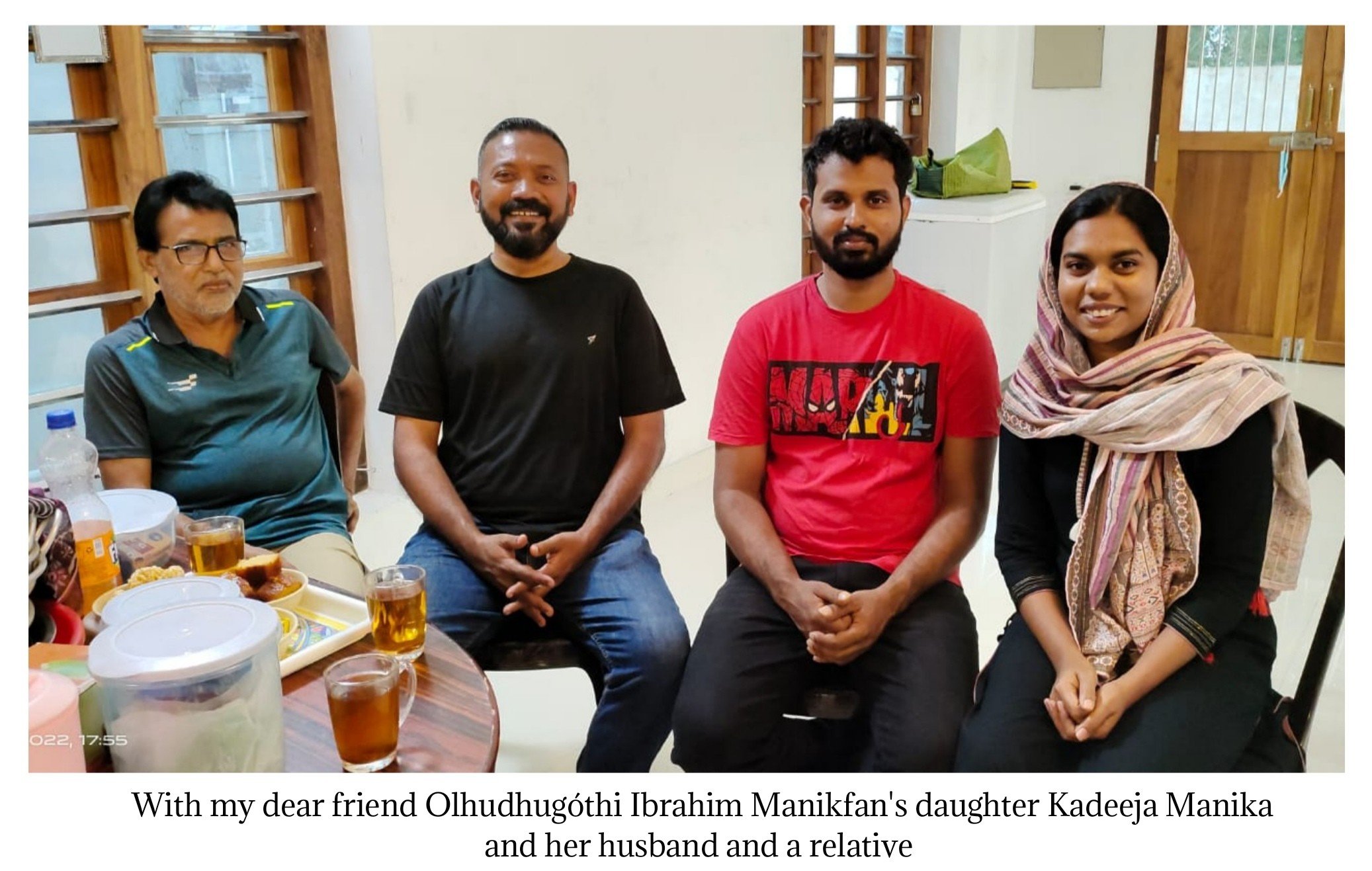
As mentioned earlier, the Kochi trip was for medical purposes, so we went to "Hyatt Clinic" in the area where Maliku people reside for my cousin, Dhondhaththaa's dental issue. We went there based on recommendations from two or three people from Maliku who said there was a very good dentist there. Coincidentally, that doctor turned out to be the daughter-in-law of my guide and friend, KG Mohamed. It was Kunnugé Dr. Fauziyya. We also met another doctor from Maliku at the clinic. It was Gobolhigóthi Dr. Hafeeza. She is a general practitioner. We have exchanged chats through WhatsApp earlier. She is also the daughter of my friend Gobolhigóthi Husenko's sister, who was the first person from Maliku I became friends with. Her father, Maayagóthi Hasanbe, is also a friend.
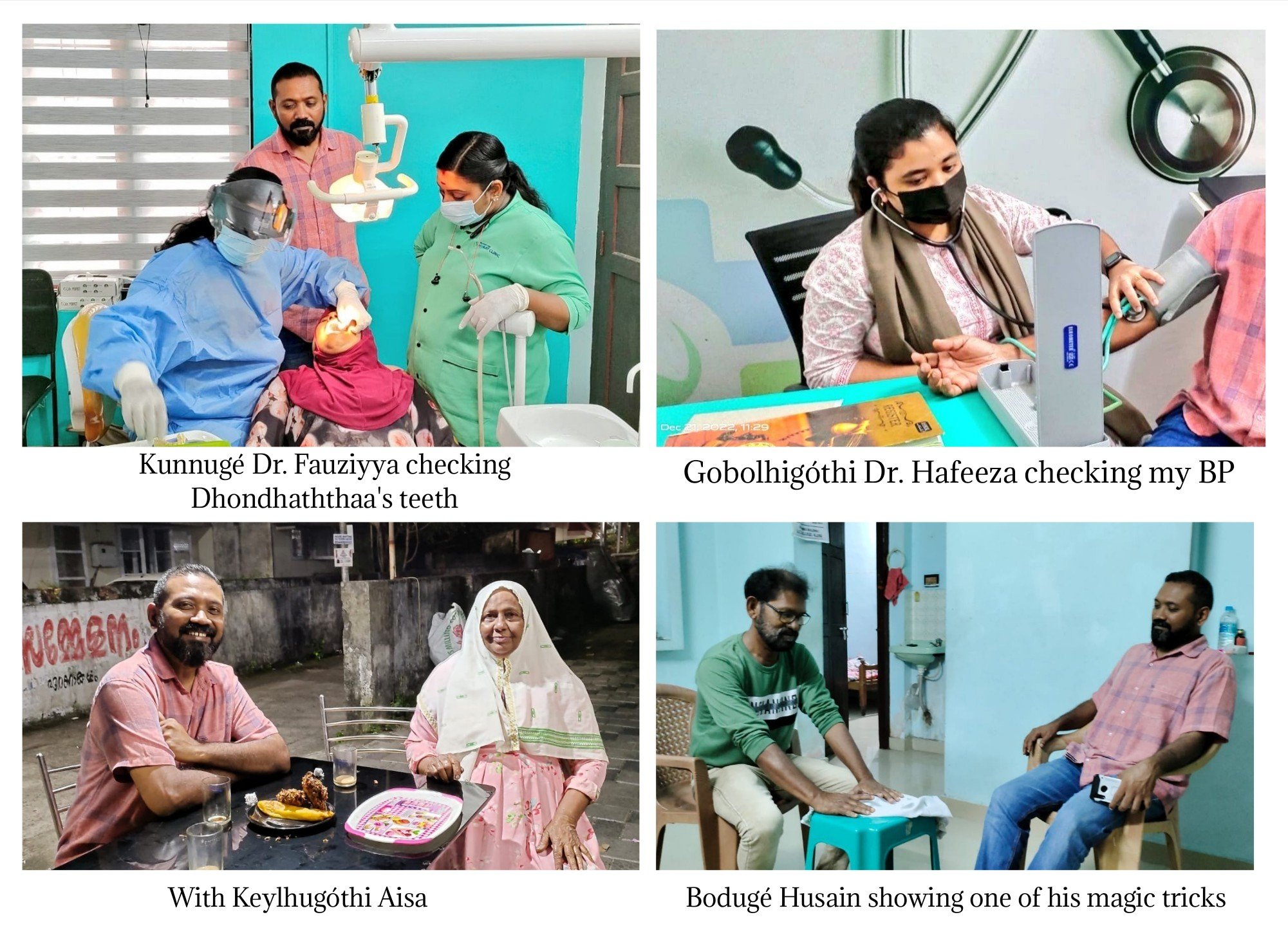
After leaving Dhondhaththaa at the clinic, I went out for a walk. On my way, I met KG and also met Bodugé Husain, whom I had become friends with in Maliku. Husain suggested we visit the house where he was staying, so as we were walking down that street, we saw two Maliku women wearing traditional Maulibas sitting at a small café-like place at a corner selling food items. When we inquired, we found out it was a tea shop run by Keylhugóthi Aisa from Aumagu Avah of Maliku. So we decided to stop for a cup of tea infused athara, a type of essence added to beverages like tea for flavoring. Anyway, the tea brewed with athara was very delicious. Aisa, who is now in her sixties, has served as a member of both the Maliku Village Dweep Panchayat (Island Council) and the Lakshadweep District Panchayat (Atoll Council). After having tea there, we went to the house where Bodugé Husain was staying. At the house, he showed us the magic tricks he performs. Husain is a skilled magician.
I had the opportunity to meet Naakathorhigé Dr. Khairunnisa, who was the first person from Maliku to obtain a PhD and one of Maliku's special friends whom I hadn't met before through social media. She lives in Hyderabad with her husband Masrook Dar and their two children. Masrook Dar is from Kashmir. Khairunnisa works as an assistant professor in the Department of English at Maulana Azad National Urdu University in Hyderabad. Her husband was an assistant professor at the University of Hyderabad. She came to meet me at our hotel, despite her busy schedule, as she was leaving for Maliku on December 21st for her cousin's wedding on December 22nd. I first came to know Khairunnisa through the social media platform Orkut about ten to twelve years ago. However, this was our first face-to-face meeting. Khairunnisa has always been a friend with whom I exchange ideas about literature, culture, and history.
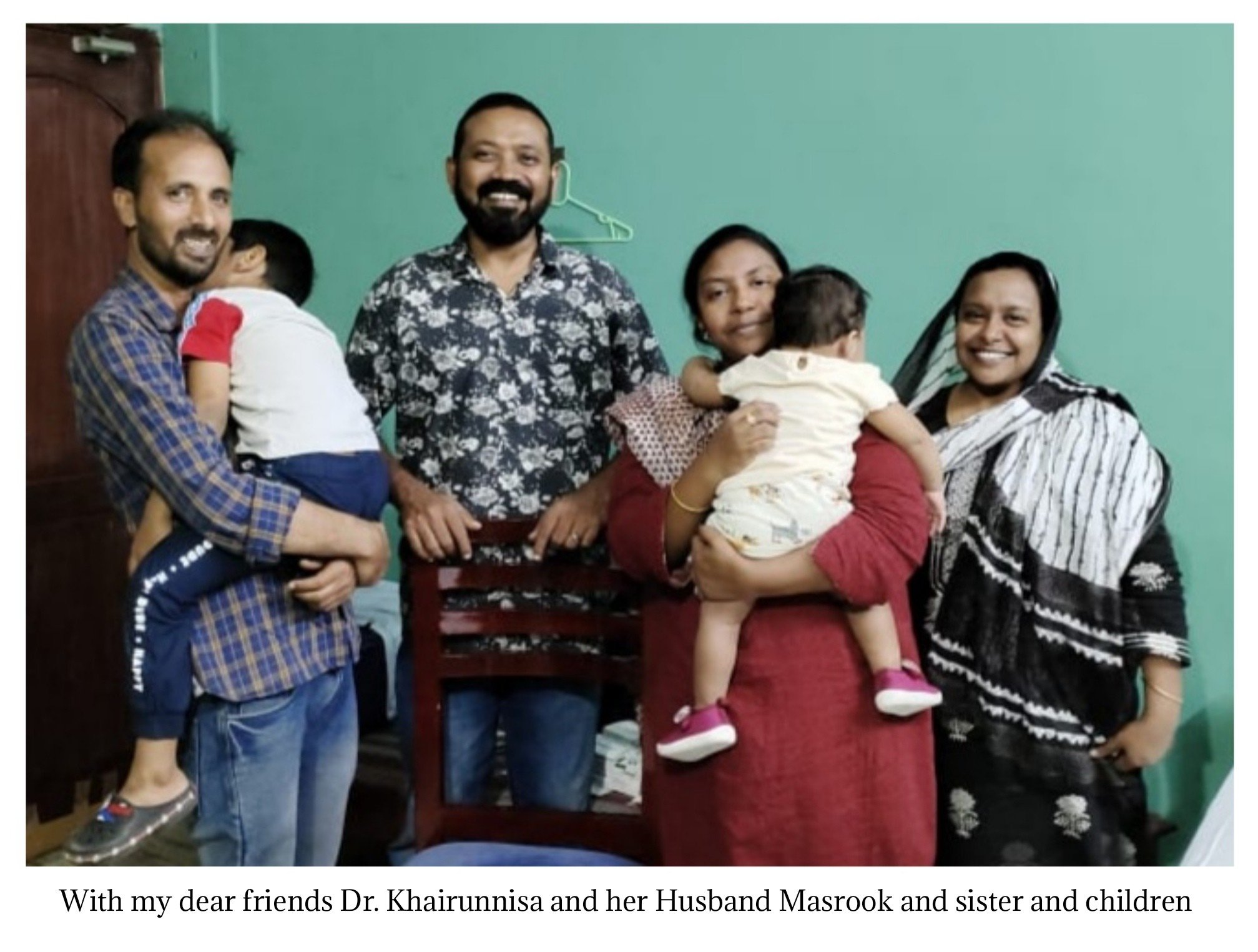
During this trip, I received invitations to two wedding parties. One wedding was between Naseer, son of Than'burugan'dugé Moosa and Valhugóthi Aisa, and Aisha, daughter of Kan'burugé Biddharugé Mohamed and Eesakunnugé Kaiydha. The wedding reception was held at night at Hotel Park Central in the Kaloor area. The event took place in two halls of the venue. I went there with KG. It was all people from Maliku. The faces all had distinctly Maldivian features. I met and befriended many new people. I also met my friends Athirigóthi Kadeeja and her husband Kandamaathugóthi Mohamed there.
The second wedding reception I attended was at midday. The wedding was between Athirigé Hafeez from Baada Avah and Aiykangé Rumaisa from Boduathiri Avah. Coincidentally, my eldest daughter's name is also Rumaisa. I attended this party with my friend KG as well. It seemed like there were about five hundred or more people there. Almost all were from Maliku. I saw many familiar faces. It was a mixed bag of emotions to be surrounded by so many Maliku people. It felt like I was back home because there were so many individuals speaking our native tongue and looking just like us, especially in this happy environment.
During this trip to Kochi, in addition to the previously mentioned individuals, I met many people from Maliku. Among the notable people I encountered was Athirigé Hassan from Athirige of Baada Avah, who introduced the first water pump to Maliku, installing it on his fishing boat "Niyaaz" in 1996, replacing the traditional method of spraying water with 'funaforhi' (fenfulhafi), as it's called in the Maliku dialect. He also introduced the'sathoa bulhi' tuna fishing hook, commonly used by Maldivian fishermen for pole-and-line fishing, to Maliku fishermen around 1996. Before that, Maliku fishermen used the same type of fishing hooks that were used in the Maldives in earlier days.
I also met Holhidhaathagóthi Hassan Thakuru of Baada Avah, who had retired from his position as a Publicity Officer in the Lakshadweep Information and Public Relations Department. His maternal grandfather was from Thakandhoo, North Thiladhunmathi Atoll in the Maldives. I also met Kudakaddhaathagé Maulavi Hussain from Funhilolhu Avah, a retired Arabic teacher and Islamic scholar, and Anwar's father-in-law, Alikeugóthi Moosabe, whom I befriended during the trip. Moosabe is an experienced Keylhu (Keyolhu - Fishing boat captain) who wore a'mundu' (sarong) and a handkerchief tied on his head, resembling an elderly Maldivian man of his age. I met many more people, but as this account is already quite long, I will conclude here.
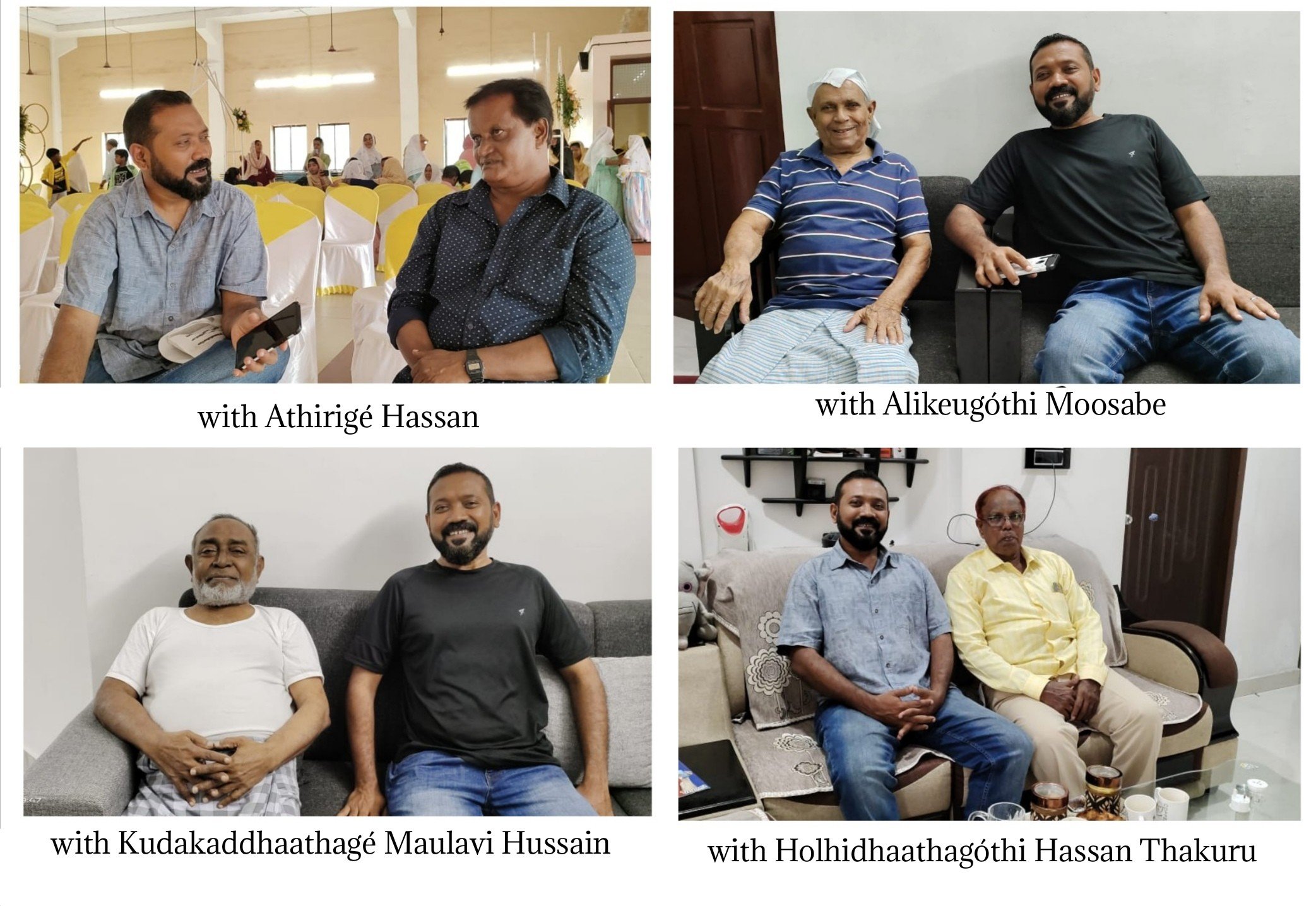
But Before concluding, I would like to say a few words about the Maliku dialect. The Maliku dialect differs slightly from the Male' dialect, which is the standard dialect of the Dhivehi Language. This is due to changes in both dialects that occurred after the connection was lost in 1956, as previously stated. As a result, when a Maliku person speaks in the Maliku dialect, some terms may be strange to a typical Maldivian. Similarly, when a Maldivian speaks, they employ several terms that Maliku people may not comprehend. However, the Maliku dialect, known as 'Mahal', is considerably more similar to the Male' dialect than my own native Addu dialect. Despite this, many Maldivians speak to Maliku people in the same way they speak to expatriate workers in the Maldives. I don't think this is the proper approach. We should strive to communicate in the standard Dhivehi dialect so that we can master both dialects. I've learned their dialect throughout the years and always attempt to speak in their style when conversing with them. As a result, many Maliku people tell me that they understand all I say, and I understand what they say.
This journey to Kochi, just like the one to Maliku, was just as enjoyable as repeating the experience of the trip to Maliku in 2015 for the second time.

My connection with Maliku dates back to around 1993/94, when I was studying at Majeediyya School. I began learning about Maliku through the Faiythoora Journal published by the National Center for Linguistic and Historical Research. This sparked an interest based on information gathered by Abdullah Sadiq and Abdullah Farouk Hassan during their visit to Maliku in 1990. Since then, I have been collecting various information about Maliku and researching the island and its inhabitants. In the process, I have met and befriended different people from there.
The first person from Maliku I met was Edhurukaagé Mohamed (Maliku Mohamed), who worked in Male' from the 1990s to the 2000s. I met him around 1999. Through the friendship with Maliku Mohamed, I obtained a telephone directory of Maliku and contacted many people, forming friendships. One such person I befriended was Kolhugegé Mohamed, also known as KG Mohamed, who provided much information for the articles about Maliku written by Abdullah Sadiq and Abdullah Farouk Hassan in Faiythoora.
Before the friendship that developed through the telephone directory with KG, in the early 2000s, a simple website about Maliku was created by Gobolhigóthi Husainko and Kanakkufulégé Nazeer Manikfan, and a friendship developed between them through email. In or around 2003, I became friends with Muraedhugan'duvaru Dr. Muneer Manikfan, a Maliku medical doctor who came to work in the Maldives. In the same year, Athirigóthi Kadeeja Manika and her husband Kandamaathugóthi Mohamed, and Alimaalimeegóthi Fathima Manika, along with their children, made a trip to Male', where friendships were formed that continue to this day. Following that was Muraedhugan'duvaru Ali Manikfan, a polymath who was awarded the Padma Shri, one of India's most prestigious awards. We became close friends as a result of his visits to Malé, and he continues to be an invaluable source of knowledge.

In addition, through social media, trips to India, Maliku, and from Male', close friendships have been formed with many people from Maliku. Among the notable individuals in this regard are Athirigóthi Rashad, his wife Fathuma, Athirigóthi Azeez, Fengennagóthi Mohamed (FG), Kirubuigóthi Ibrahim Maulavi, Hasanbébegóthi Saleem, Muraedhugan'duvaru Ibrahim Manikfan, Nakathorhigé Dr. Khairunnisa (the first PhD holder from Maliku), Olhudhugóthi Ibrahim Manikfan, Olhudhugóthi Hussain Manikfan, Ibrahim Manikfan of Naibuge, his son Nabeel Manikfan, and Bodugan'duvaru Nizam, Aloodigan'duvaru Ajmal. Even though not all names are mentioned here, there are many more close friends in Maliku.
When discussing Maliku, I believe it is important to briefly explain what Maliku is and its connection to the Maldives and India. Maliku is a small atoll located about 70 miles north of the Maldives. The official name for Maliku in India is Minicoy. This is a change that came about due to cartographers of ancient times mistakenly writing the name of Maliku as Minicoy, which then made its way into English documents. The Maliku people and Maldivians still call the island Maliku. Although referred to as an atoll, it consists of a single reef, similar to Kaarhidhoo. The entire atoll comprises only two islands: Maliku, which stretches along the length of the atoll, and a very small island called Virin'gili. There is also a sandbank called Raggan. Maliku is a large island, approximately 11 kilometers long with an area of 4.8 square kilometers. In terms of land area, it is roughly the same size as Fuvahmulah. The population is also similar, at around 12,000 people. The physical characteristics of the people, including their appearance, color, height, and features, are identical to those of Maldivians. Their language, culture, and customs are also the same. Due to a long period without contact with the Maldives and its connection to mainland India, some influences, especially from Kerala, have seeped in. This is more noticeable among the youth and middle-aged population, while the elderly retain more Maldivian characteristics.
Throughout history, Maliku was under Maldivian rule at various times, most recently until 1752, when Ali Raja of Cannanore conquered the Maldives and took control of Maliku too. After less than 4 months, the Maldives was liberated from Ali Raja, but Maliku remained under their rule. Later in 1790, when the British East India Company took control of most of the countries in the Indian subcontinent, Ali Raja was allowed to administer Maliku in return for a tribute to the East India Company. In 1858, suzerainty over Maliku was transferred from the East India Company to the British Crown in the person of Queen Victoria. However, Ali Raja's full control over Maliku was lost in 1905. From 1905, Maliku was governed under the Malabar District of Madras Presidency of British India. When Pakistan and India gained independence in 1947, Maliku became part of the Republic of India. However, until 1956, when Maliku became part of the Union Territory of Laccadive, Minicoy, and Amindivi Islands, there was direct travel and close ties between the Maldives and Maliku. After 1956, when the border between the Maldives and Maliku was closed, these connections weakened, and subsequent generations lost knowledge of each other. The linguistic and cultural ties also began to change.
Today, Maliku is an island in the Union Territory of India called Lakshadweep. The only way to reach Maliku is through the port of Kochi in India. Therefore, when Maliku people come to the mainland, they mostly stay in Kochi. The Kaloor area of Kochi is where a large number of Maliku people reside. Maliku people have also settled in other areas of Kochi, other parts of Kerala, and some other regions of India. Since they are Indian citizens, there are quite a few Maliku people who have bought properties and live in these places. It is estimated that approximately 3000 Maliku people stay in Kochi.
As mentioned earlier, my trip to Kochi was for medical treatment. Therefore, the majority of the time was spent on that. During the free time, I met with Maliku people in various parts of Kochi, especially in the Kaloor area. My longtime friend KG Mohamed, who resides in Kochi, acted as a guide. We were originally scheduled to travel on December 6th. However, due to unforeseen circumstances, we had to postpone the trip to December 10th. The reason for choosing the 10th was to attend a Maliku couple's wedding ceremony in Kochi. Unfortunately, we missed the ceremony as we failed to check the time on the invitation card and arrived in Kochi after it had ended. The ceremony was held at noon, and we reached our hotel around 9 PM.

That day, we were picked up from the airport by Dr. Muneer Manikfan and KG Mohamed, who are among the closest friends from Maliku. They came in two separate cars. Muneer came with his son Samah. KG's car was driven by Dhonfaandhaathagé Anwar, with whom I developed a friendship during this trip. From the airport, we first went to Muneer's house in Aluva. There, we met Muneer's mother, his wife, Aloodigothi Sakeena, and three of his four children: Samah, Shaima, and Shafin. Muneer's eldest daughter, Maleeha, was studying in Coimbatore. We had tea at Muneer's house before heading to our hotel. We stayed at Hotel Matha Residency near Amrita Hospital, which is mainly frequented by Maldivians. There's also a restaurant specializing in Maldivian cuisine on the ground floor of the hotel.

The next day at noon, Athirigóthi Kadeeja Manika and her husband Kandamaathugóthi Mohamed, who are among my closest friends from Maliku, brought some of Malik's special dishes, including Maliku Faraataa, Raiy Riha, and some other food items. Maliku Faraataa is a special faraataa that Malik people have been making for a very long time. It is a delicious, square-shaped faraataa. Unlike regular faraataa, it has less oil. Raiy Riha is also a special spicy curry from Maliku. During the trip to Maliku in 2015, almost every morning for breakfast, at Athirigóthi I was provided Maliku Faraataa and Raiy Riha. There were other varieties as well. Raiy Riha is similar to the Kulhi Riha commonly made in the Maldives now. This curry, made with ground dried chili, is very delicious.
Afterwards, since it was Sunday and there was nothing scheduled at the hospital, we went to Dr. Muneer's house. We returned to the hotel after having evening tea and dinner at Muneer's place. We had once again experienced the delicious snacks and savoured the tastes of Maliku's traditional Maldivian cuisine that we had tried before. We spent another day at Muneer's house after that.

The main part of the trip, especially the morning and afternoon hours, was spent on medical treatments. The evening and night hours, as well as Sunday, which is the weekend, were dedicated to visiting and meeting with various friends of Maliku at their homes. On the second Sunday, the day was spent at the apartment where Athirigóthi Rashad and his wife Fathuma live. This apartment is on the ground floor of the building where his sister, Athirigóthi Kadeeja Manika, also resides. Kadeeja's family lives on the upper floor. Kadeeja's family and Rashad's family had prepared a delicious lunch for us. It was all traditional Maldivian-style cuisine from Maliku. There was Dhirifiyaalee Baiy (a type of rice), Maliku Faraataa served with Huiy Barhi Riha (a local Maliku brinjal curry), Raiy Riha, Muran'gatholhi Kirudhiya (a Maldivian-style drumstick curry), Mas Riha (tuna curry), and fried chicken. The flavors were not unfamiliar, but rather a very Maldivian and delicious. After lunch, we spent the rest of the day until night at that house.
Dinner was scheduled at an apartment in "Ismail Makaan," a private residence owned by the Dhaathifaanungóthi people from the Kudhehi Avah of Maliku. One of the people I befriended during my trip to Maliku in 2015 was Kan'bógóthi Moosa Manikfan. He is commonly known as Kan'bó Bappa. During that trip, I also met and became friends with his children, including Leyndhurangan'duvaru (LG) Ibrahim Manikfan and Hanifa Manika. He prepared and served me delicious traditional Maldivian food at his home. During this recent trip to Kochi, while I was here, I learned that Kan'bó Bappa had also come to Kochi for a hernia surgery. When I called Hanifa, his daughter, they invited us for a meal at their rented apartment in Ismail Makaan. So, after staying at Rashad's house, we went to Kanbo Bappa's apartment for dinner. They had prepared a traditional Maldivian meal, similar to what I had in Maliku. This meal is called 'Kiraaibaiy'. It consisted of rice, Masfen (tuna water made in coconut milk), Forippi Rihaakuru (specially fried Rihaakuru), fried baitfish, fun'disatani, and green pea curry. It was very Maldivian and equally delicious. Our friend Kan'bó Bappa is now over 80 years old and was formerly a fisherman. Even when I visited Maliku in 2015, he was still going fishing on the Athirigóthi Laanchi (fishing boat). On November 19th of last year, his son Leyndhurangan'duvaru (LG) Ibrahim Manikfan launched a 55-foot fishing boat named 'Karanfoo'. Although Kan'bó Bappa doesn't go fishing anymore, he now handles all the net-making work needed for the Karanfoo boat.

One of the special people encountered during the Cochin trip was Ibrahim Kudahaajigóthi, a retired folk dance master. He received training in that field from the mainland and went to Maliku, becoming one of the foremost people in reviving and promoting cultural dances in Maliku. We also met during the 2015 trip to Kochi to go to Maliku. Both times, the visit to his house was under the guidance of KG Mohamed. One of the key figures who played a leading role in reviving the extinct cultural dances in Maliku alongside dance master Ibrahim was KG. Another person involved in this was the late Maugasdharhugóthi Maulavi Ali Ismail Umari, a former Katheeb of Maliku who was among the island's religious scholars. Ban'diya dance and Lava Beru are two dances that have been revived through the tireless efforts of these people from among the extinct cultural dances of Maliku.

Many people would have noticed the reference of a FG or Fengennagóthi Mohamed in my writings on Maliku. I had known about FG Mohamed since I was a child. Abdullah Farouk Hassan mentions him in his articles about Maliku in the Faiythoora Journal. In addition, when I was in school in the 1990s, I saw FG Mohammed play the lead in a Maliku film that aired on Television Maldives. The film is named "Natheejaa" and was produced by Maliku Mohamed (Edhurukaagé Mohamed who also worked in the film industry in Male'). Although I knew FG in this way, we became friends years later over social media. I met him for the first time in person on my trip to Maliku in 2015. Since then, he has been one of my best friends among the people of Maliku. FG retired recently from his job as an Information Assistant and Photographer at the Lakshadweep Publicity Department in Maliku. FG and his wife lived in Malappuram, which is around 160 kilometers from Kochi, when I visited Kochi. His daughter, Dr. Maimunnisa, an eye expert, worked at a specialised eye hospital there. When he heard about my arrival in Kochi, he came by morning bus on Sunday, the weekend. It's about a 4-hour trip. He visited Kochi twice while I was there, accompanied by his wife, daughter, and granddaughter. FG is the person that provides Maldivians with the most up-to-date news on Maliku and Lakshadweep in Dhivehi on Facebook.

One day during the trip, while riding a motorcycle with Rashad in the Kaloor area of Kochi, I saw a restaurant with its name written in the Thaana script of the Dhivehi language. It was written as 'KFG Cafe and Restaurant'. When asked who owned the restaurant, it was said to be run by people from Kaafógóthi in Baada Avah, Maliku. KFG stands for Kaafógóthi. Located on Deshabimani Road in the Kaloor area, not far from Karukappalli Junction, this restaurant offers Maliku-style cuisine prepared according to their tastes, available from evening onwards. Various delicious drinks are also available. The most unique special drink I found was Gulkan'dhu Boost. It's a cold drink made by adding gulkan'dhu (sweet preserved rose petals) to a chocolate malt drink called Boost. One evening, after staying at Rashad's place, we went there for dinner. We ate Maliku Faraataa, beef curry, onion rice, and grilled fish. It was very delicious. A new friend I met there was Karaagé Moosa, who is married to a woman from Kaafógóthi. I visited the place two more times after that. On one occasion when I went with KG, I met Nasir, the famous Maliku singer whom I had befriended earlier. Nasir frequently visits the Maldives. The most recent visit was during the last Eid celebrations.

One night while at KFG Restaurant, I met Asleema, a friend I made in Male'. Asleema was a teacher at the Peace School run by my friend Dr. Muneer in Maliku. I was responsible for managing the activities of the teachers who were brought to Male' for a special Dhivehi language training program for that school's teachers. This was made possible with financial assistance from many well-wishers. A very close friendship developed with all the teachers who participated in that trip. In our chat after seeing Asleema, she invited me and my family to dine at her home. When we went to find her place, we discovered that she was living on the first floor of KG's house, with her mother, father, and little child. Because my cousin's daughter had trouble walking, dinner was held downstairs in KG's apartment. It was an extensive dinner with many different Maliku flavours. Following the dinner Asleema gave at KG's residence, KG prepared a delicious chicken and tuna biryani and delivered it to our hotel the next day for lunch. My aunt and cousin said it was far more excellent than the biryani served at hotels and restaurants.

One of the special personalities encountered during this Kochi trip was Kadhdhaifaanungé Husain Manikfan, the blind singer from Maliku. KG took me to visit his house as well. The house belongs to a friend I knew before, Hasanbébegóthi Mohamed. Husain Manikfan is the younger brother of his father-in-law, Kadhdhaifaanungé Mohamed Manikfan (Kudabe). The paternal grandfather of these two brothers was from Addu Atoll, Maldives. Since both of them were born long after their grandfather had passed away, they don't know much about him. Their maternal grandfather was from Nicobar. Through KG, we learned that Husain Manikfan is a very good singer, and with his permission, we recorded two songs on my mobile phone. The first song he sang was "Kaaboa thakethi libeythee huregen meedhau hifumah bulhaleh naudhey..." (With food available, cats doesn't come to catch mice...) is a song KG composed long ago. It was made in connection with the excessive food waste by Maliku people at that time. He sang it fluently until the end, even though KG himself had forgotten it. It's a very meaningful and excellent song. The second song, "Aakhiruvi zamaanah mi dhuniye kaerivaneethaa, Dhajjaaluge nulafaa aniyaa faalhuvaneethaa" (the world nears the end times, Dajjal's evil oppression becomes apparent...), is a song that was broadcast on All India Radio in the past. The song was composed by the late Maliku poet BA (Baugé Athirigé) Ibrahim Manikfan. During the 1990 Maliku trip of Abdullah Sadiq and Abdulla Farouk Hassan, they also had this Husain Manikfan sing while sitting on the on'dhoali (swing bed) at Kadhdhaifaanungé.

Undoubtedly, the most special personality among Maliku's close friends is Muraedhugan'duvaru Ali Manikfan, who has been awarded the Padma Shri, the fourth highest civilian award given by the Government of India. Born on March 16, 1938, Ali Manikfan is not someone who has been educated through a formal educational system. However, he is an expert in many fields of knowledge. He is a marine scientist, an environmentalist, an astronomer, and a skilled boat builder. A newly discovered fish has been scientifically named after him. The British explorer Tim Severin used Ali Manikfan as the master carpenter to build a ship similar to the one Sindbad is said to have traveled in. He has invented an Islamic lunar calendar that can be uniformly followed by all parts of the world. According to his calendar, special days like Ramadan, Eid, and Hajj would fall on the same day throughout the world. He has advocated for this for about fifty years.

I first met him when he came to the Maldives around 2007 to meet with relevant authorities to advocate for this cause. On that occasion, I arranged for him to meet with the President of the Supreme Council for Islamic Affairs, Sheikh Mohamed Rasheed Ibrahim, and other relevant parties. Later in 2009, when he came to Malé for the same purpose, I again arranged meetings with relevant parties. This included meetings with the then Islamic Minister, the late Dr. Abdul Majeed Abdul Bari, members of the Astronomy Committee, and other senior officials of that ministry. At his request, I typed and distributed a handwritten document he had written in Thaana script about the Hijri calendar to all relevant institutions in the Maldives.
Ali Manikfan has visited the Maldives several times since then. On one occasion, I even sent him to my native atoll, Addu. The friendship I had with Ali Manikfan is very close. In 2007, when I took my grandfather on a medical trip to Trivandrum, he traveled from Valliyoor in Tamil Nadu, where he was living at the time, to Trivandrum, just to meet me. Then, during this recent trip to Kochi, even at the age of 84, he traveled from Kozhikode with his stepson to meet me at our hotel. That was a great honour for me.
As mentioned earlier, we wanted to attend a Maliku wedding the day we arrived in Kochi, and unfortunately, as we arrived late, we couldn't attend it. But on December 16th, there was a special night feast at the bride's house related to the wedding. In Maliku culture, this feast is called "Echchethi Laandhaa Baiy." I attended this feast with my friend KG. The bride was Aadhangé Asima from Funhilolhu Avah, and the groom was Bandaaragé Mohamed Yasin from the same avah. Here, I met the bride's father, Thileyrugóthi Mohamed, who is the secretary of the "Minicoy People's Welfare Association" established in Mumbai specifically for the seafarers from Maliku. The main occupation of Maliku men is seafaring. Previously, he had served as the Mooppan or Bodukaaka (the Avah Chief) of Funhilolhu Avah.

Dr. Ismail, a dentist from Maliku, is a doctor I met in Trivandrum, India, during a medical trip in 2007. One day, while walking on a street in Trivandrum, I saw a sign in the Thaana script that read "Fathima Dental Clinic." Upon entering, I found it was run by a doctor from Maliku. Dr. Ismail was assisted by his wife Rajeena, who is also from Maliku. After 2007, many years passed without meeting Dr. Ismail until last year, when we met again in Male'. He had come to work at a clinic opened in Alifurhi, North Maalhosmadulu Atoll (aka Raa Atoll). During this trip to Kochi, he called one day, saying he was also in Kochi, and invited me to meet at "Hikithavaa." When I went there with my friend KG, it turned out to be a small café run by Alimaalimeegóthi Fathima Manika, whom I had befriended in Male' in 2003. Fathima Manika is educated in civil engineering. She has served as an assistant engineer in the Lakshadweep Public Works Department and has now retired. She has bought a house in Kochi and spends her time running "Hikithavaa." She makes very delicious snacks.

One of my closest friends in Maliku is Olhudhugóthi Ibrahim Manikfan. He is a member of the Maliku "Village Dweep Panchayat" (Maliku Island Council). He is also closely connected to the Maldives. His maternal grandfather Husain Didi is from the aristocratic Kakaagé family of Malé. He has cousins living in Male'. We had previously established a friendship through WhatsApp. We first met in person about three or four years ago when he came to Male' with his wife and two children. Similarly, I have a close relationship with his brother, Olhudhugóthi Husain Manikfan, through WhatsApp. However, we haven't met in person yet. During this trip to Kochi, Husain Manikfan was away on a trip. Ibrahim Manikfan was in Maliku. However, his daughter Kadeeja Manika came to Kochi and sent a gift from Ibrahim Manikfan to the hotel where I was staying. Later, along with my friend KG, we visited the house where Kadeeja and her husband live.

As mentioned earlier, the Kochi trip was for medical purposes, so we went to "Hyatt Clinic" in the area where Maliku people reside for my cousin, Dhondhaththaa's dental issue. We went there based on recommendations from two or three people from Maliku who said there was a very good dentist there. Coincidentally, that doctor turned out to be the daughter-in-law of my guide and friend, KG Mohamed. It was Kunnugé Dr. Fauziyya. We also met another doctor from Maliku at the clinic. It was Gobolhigóthi Dr. Hafeeza. She is a general practitioner. We have exchanged chats through WhatsApp earlier. She is also the daughter of my friend Gobolhigóthi Husenko's sister, who was the first person from Maliku I became friends with. Her father, Maayagóthi Hasanbe, is also a friend.

After leaving Dhondhaththaa at the clinic, I went out for a walk. On my way, I met KG and also met Bodugé Husain, whom I had become friends with in Maliku. Husain suggested we visit the house where he was staying, so as we were walking down that street, we saw two Maliku women wearing traditional Maulibas sitting at a small café-like place at a corner selling food items. When we inquired, we found out it was a tea shop run by Keylhugóthi Aisa from Aumagu Avah of Maliku. So we decided to stop for a cup of tea infused athara, a type of essence added to beverages like tea for flavoring. Anyway, the tea brewed with athara was very delicious. Aisa, who is now in her sixties, has served as a member of both the Maliku Village Dweep Panchayat (Island Council) and the Lakshadweep District Panchayat (Atoll Council). After having tea there, we went to the house where Bodugé Husain was staying. At the house, he showed us the magic tricks he performs. Husain is a skilled magician.
I had the opportunity to meet Naakathorhigé Dr. Khairunnisa, who was the first person from Maliku to obtain a PhD and one of Maliku's special friends whom I hadn't met before through social media. She lives in Hyderabad with her husband Masrook Dar and their two children. Masrook Dar is from Kashmir. Khairunnisa works as an assistant professor in the Department of English at Maulana Azad National Urdu University in Hyderabad. Her husband was an assistant professor at the University of Hyderabad. She came to meet me at our hotel, despite her busy schedule, as she was leaving for Maliku on December 21st for her cousin's wedding on December 22nd. I first came to know Khairunnisa through the social media platform Orkut about ten to twelve years ago. However, this was our first face-to-face meeting. Khairunnisa has always been a friend with whom I exchange ideas about literature, culture, and history.

During this trip, I received invitations to two wedding parties. One wedding was between Naseer, son of Than'burugan'dugé Moosa and Valhugóthi Aisa, and Aisha, daughter of Kan'burugé Biddharugé Mohamed and Eesakunnugé Kaiydha. The wedding reception was held at night at Hotel Park Central in the Kaloor area. The event took place in two halls of the venue. I went there with KG. It was all people from Maliku. The faces all had distinctly Maldivian features. I met and befriended many new people. I also met my friends Athirigóthi Kadeeja and her husband Kandamaathugóthi Mohamed there.
The second wedding reception I attended was at midday. The wedding was between Athirigé Hafeez from Baada Avah and Aiykangé Rumaisa from Boduathiri Avah. Coincidentally, my eldest daughter's name is also Rumaisa. I attended this party with my friend KG as well. It seemed like there were about five hundred or more people there. Almost all were from Maliku. I saw many familiar faces. It was a mixed bag of emotions to be surrounded by so many Maliku people. It felt like I was back home because there were so many individuals speaking our native tongue and looking just like us, especially in this happy environment.
During this trip to Kochi, in addition to the previously mentioned individuals, I met many people from Maliku. Among the notable people I encountered was Athirigé Hassan from Athirige of Baada Avah, who introduced the first water pump to Maliku, installing it on his fishing boat "Niyaaz" in 1996, replacing the traditional method of spraying water with 'funaforhi' (fenfulhafi), as it's called in the Maliku dialect. He also introduced the'sathoa bulhi' tuna fishing hook, commonly used by Maldivian fishermen for pole-and-line fishing, to Maliku fishermen around 1996. Before that, Maliku fishermen used the same type of fishing hooks that were used in the Maldives in earlier days.
I also met Holhidhaathagóthi Hassan Thakuru of Baada Avah, who had retired from his position as a Publicity Officer in the Lakshadweep Information and Public Relations Department. His maternal grandfather was from Thakandhoo, North Thiladhunmathi Atoll in the Maldives. I also met Kudakaddhaathagé Maulavi Hussain from Funhilolhu Avah, a retired Arabic teacher and Islamic scholar, and Anwar's father-in-law, Alikeugóthi Moosabe, whom I befriended during the trip. Moosabe is an experienced Keylhu (Keyolhu - Fishing boat captain) who wore a'mundu' (sarong) and a handkerchief tied on his head, resembling an elderly Maldivian man of his age. I met many more people, but as this account is already quite long, I will conclude here.

But Before concluding, I would like to say a few words about the Maliku dialect. The Maliku dialect differs slightly from the Male' dialect, which is the standard dialect of the Dhivehi Language. This is due to changes in both dialects that occurred after the connection was lost in 1956, as previously stated. As a result, when a Maliku person speaks in the Maliku dialect, some terms may be strange to a typical Maldivian. Similarly, when a Maldivian speaks, they employ several terms that Maliku people may not comprehend. However, the Maliku dialect, known as 'Mahal', is considerably more similar to the Male' dialect than my own native Addu dialect. Despite this, many Maldivians speak to Maliku people in the same way they speak to expatriate workers in the Maldives. I don't think this is the proper approach. We should strive to communicate in the standard Dhivehi dialect so that we can master both dialects. I've learned their dialect throughout the years and always attempt to speak in their style when conversing with them. As a result, many Maliku people tell me that they understand all I say, and I understand what they say.
This journey to Kochi, just like the one to Maliku, was just as enjoyable as repeating the experience of the trip to Maliku in 2015 for the second time.





